Answering the call to courage: What happened at the 2024 ILGA-Europe Conference
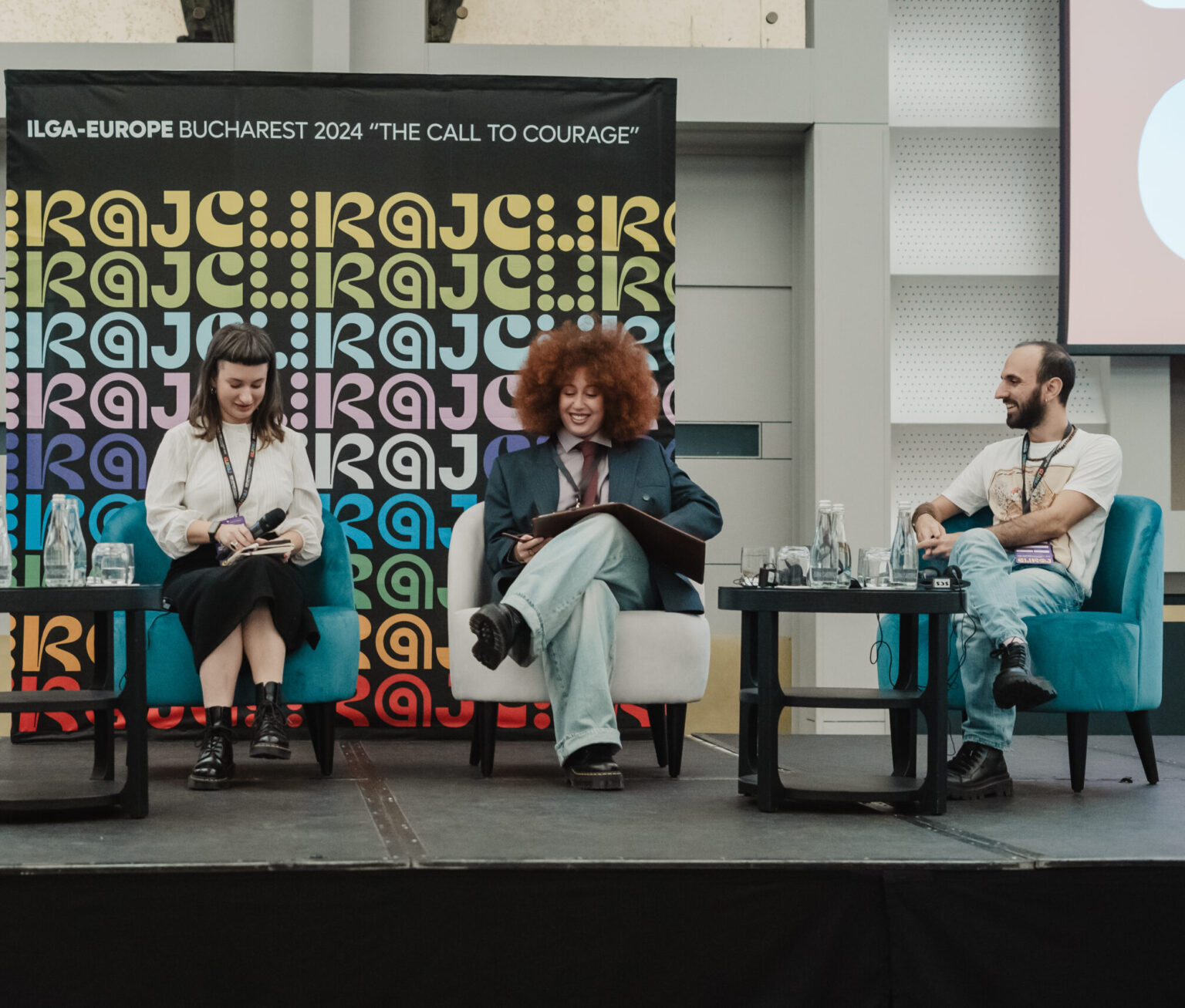
At this year’s ILGA-Europe Annual Conference in Romania, we had three dedicated activist reporters attending sessions across the event, so they could reflect on what was happening right now for the LGBTI movement in Europe and Central Asia. Here is what they found.
The 26th ILGA-Europe Conference, held in Bucharest this October, was a vital meeting ground for activists, leaders, and changemakers from across the LGBTI community, at this particular time in our world. Beyond its extensive sessions and networking opportunities under the theme, The Call to Courage, this year’s event featured the reintroduction of conference reporters—three dedicated activist voices tasked with connecting the threads of reflection, insight, and shared experience throughout the event. These reporters, Rina Rybalko from Ukraine’s Gender Stream, Sarah Arsane of Pride des Banlieues in France, and Andrea Ruggeri from Italy’s Gruppo Trans, shared their expectations, reflections, and key takeaways over the course of the packed three days.
Hope and expectation
Rina approached the conference with hope, acknowledging the uncertainties facing activists but focusing on the potential for solutions. “Since this is my second time at the conference, I know that we will talk about challenges a lot,” she shared. “And I hope that in these discussions we will find together decisions and solutions that we will bring back home to our communities.” This outlook was a testament to the resilience that Ukrainian activists have shown, especially amidst Russia’s ongoing full-scale invasion and its impact on LGBTI communities.
As the conference began, Sarah expressed excitement at the rare opportunity to connect with likeminded people. “I’m really looking forward to meeting LGBTQ+ activists from all over the world and hearing the unique stories and struggles,” she said. Her anticipation highlighted the conference’s role as a space for exchange, learning, and mutual empowerment.
Andrea, acknowledging both the gravity of their work and the community’s strength, spoke with poignant honesty. “Yesterday was not a good day for my country,” they remarked, referring to a newly passed law in Italy that criminalises seeking surrogacy abroad, a move that threatens LGBTI families and sets a concerning precedent. This difficult reality highlighted their hope to find emotional and political support while drawing strength from shared experiences.
Reflections during the conference
As the conference unfolded, each reporter shared insights into their evolving experiences. For Sarah, moments of connection stood out. Reflecting on the importance of unity and exploring vulnerabilities to promote growth, she said, “I particularly enjoyed the discussions on the various issues facing our communities. Being a Muslim woman, a racialised lesbian, and from working-class neighbourhoods, this particularly moved me.”
Rina was moved by the power of collective communication. “The highlight for me was communication—panel discussions, workshops, and networking, which was meaningful, fruitful, and sometimes challenging,” she noted. This understanding emphasised the importance of shared spaces where LGBTI voices can overcome barriers, address urgent needs, and build alliances.
Andrea’s reflections captured the diverse and layered nature of the Conference. “In one room, people are getting pragmatic by discussing how to tackle disinformation campaigns; in another, others are sharing how resilience keeps them grounded,” they observed. This collection of experiences showed how different strategies and discussions come together to strengthen our shared determination.
Courage as a takeaway
As the conference drew to a close, the atmosphere was charged with renewed determination. Rina spoke of courage as a verb: “It means to act, even when we are in a state of maximum uncertainty, for your own sake, for the sake of others.” She left the conference inspired by the dedication of fellow activists and motivated by the focus on meaningful change.
Sarah, in her closing words, summed up the spirit of solidarity at the Conference and within the movement. “What I take away is the strength of our community and the power of alliance… even in difficult times, we are stronger together,” she affirmed. Her speech served as a reminder that collective resilience, empathy, and unity are vital for progress.
Andrea concluded by highlighting a lesson learned year after year: “Queer people are taking care of themselves and teaching others how to take care of their communities.” This ongoing truth showed the depth of support and self-sustainability within the LGBTI movement, despite outside challenges.
A unified future
The conference reporters’ voices were a strong reminder that, while activists in our LGBTI movement may come from different contexts, the shared fight for dignity, safety, and rights binds them together. As they return to their home countries from this year’s Conference—whether grappling with legislative struggles, seeking innovative advocacy strategies, or rebuilding communities torn by war—they carry with them the shared knowledge, strength, and hope forged in Bucharest.
The ILGA-Europe Annual Conference 2024 in Pictures
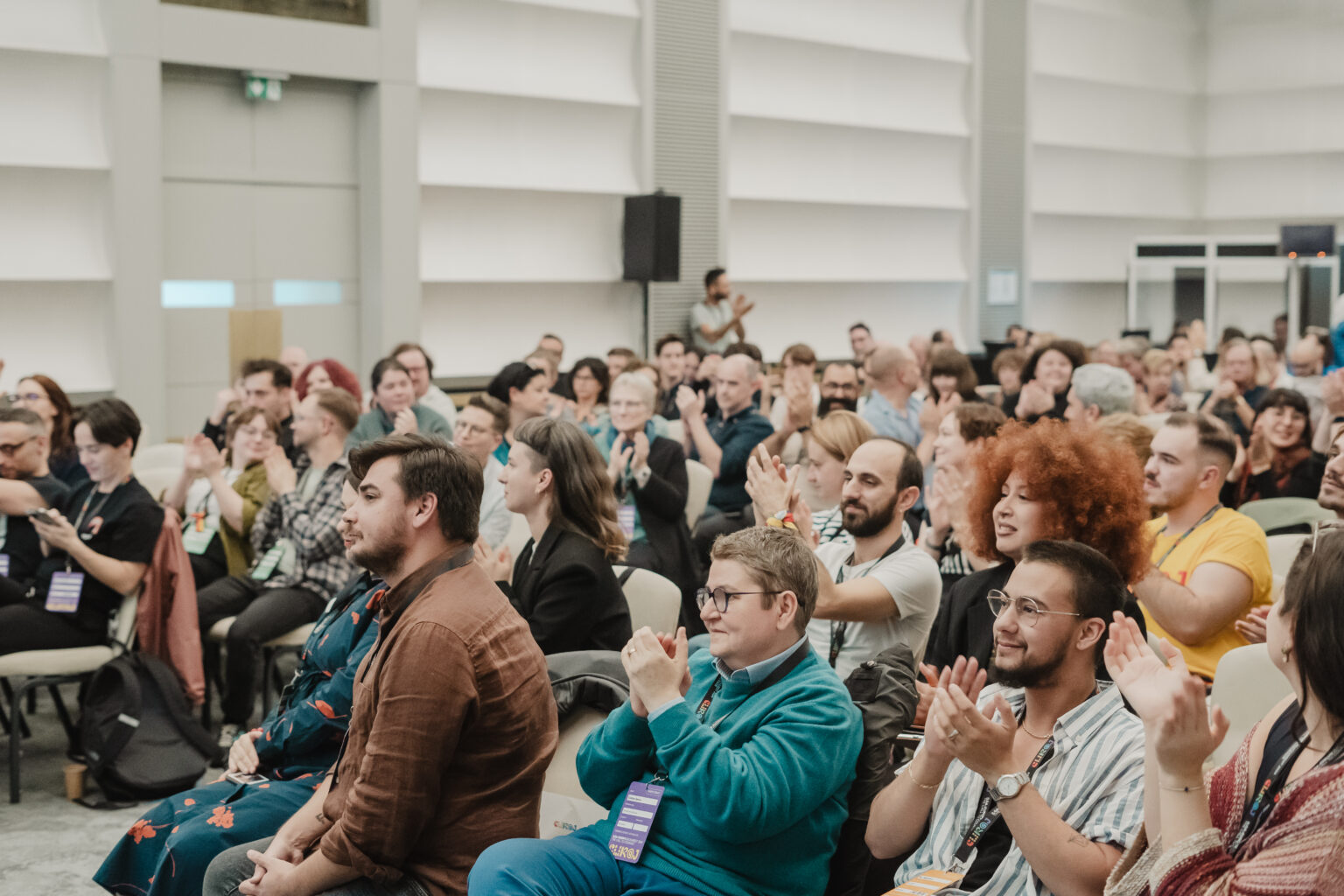
For four days in Bucharest, our photographer was there to capture every memorable moment of this year’s Annual Conference. Here are the highlights!
This October, we came together in Bucharest with over 400 LGBTI activists and allies from across Europe and Central Asia for ILGA-Europe’s Annual Conference. And what a journey it was! Four inspiring days filled with connection, sharing, strategising, and bolstering resilience for the challenges that lie ahead, all within an atmosphere of support and mutual empowerment. This year’s theme, The Call to Courage, rang through each panel, workshop, and conversation as we tackled pressing issues and explored new ways forward. And, of course, there were moments of celebration too, including a night Karaoke and a closing celebration with drag performances paired with local DJs.
Our heartfelt thanks go to our wonderful hosts, ACCEPT and MozaiQ, and to our talented photographer Larisa Balta, who captured the spirit of the conference. Here, we share a snapshot of those unforgettable days!
For a much larger selection of photos, be sure to check out our albums on Facebook.
The ILGA-Europe conference, the largest LGBTI conference in Europe and Central Asia, meets in Bucharest this weekend
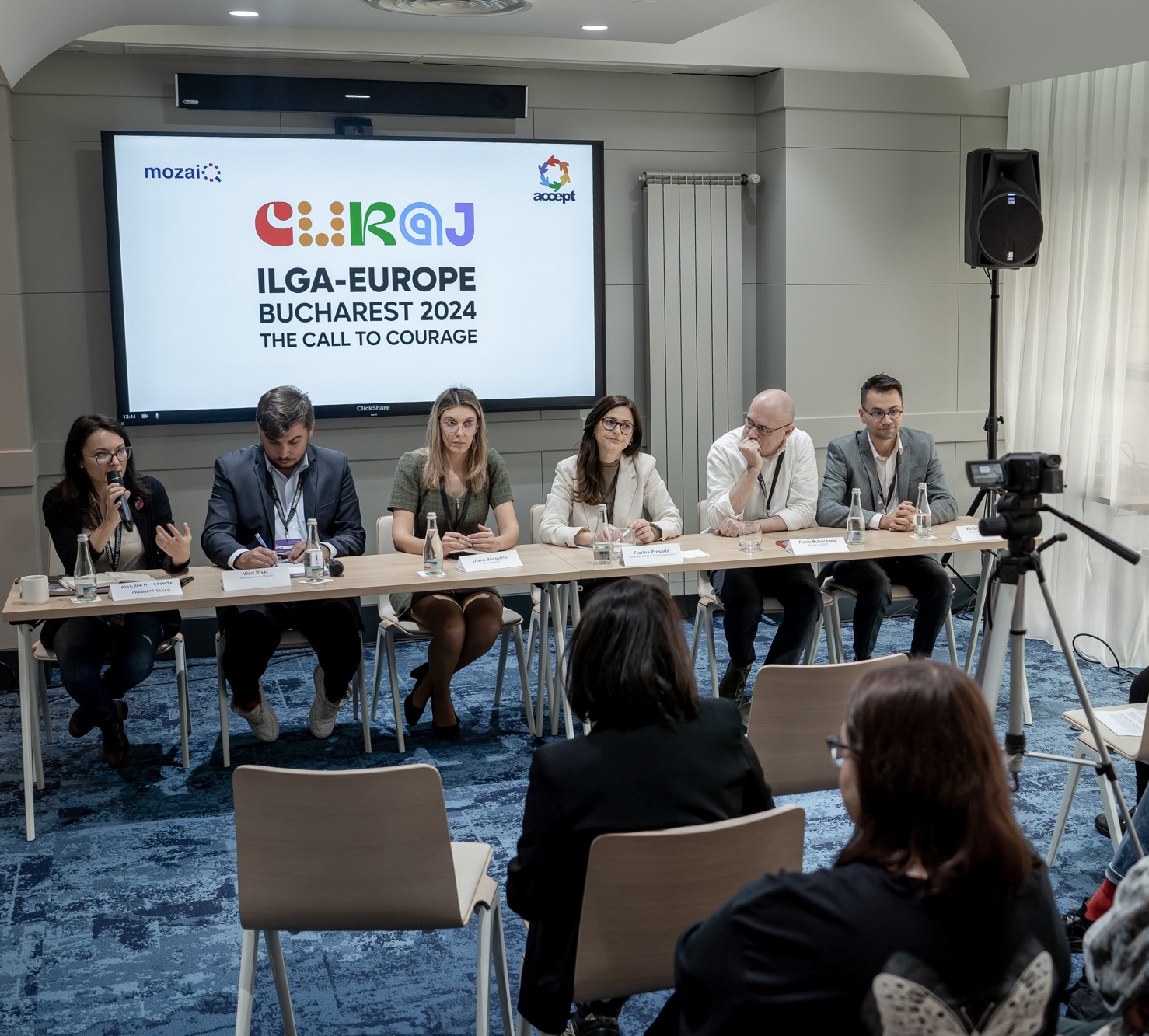
The ILGA-Europe Annual Conference, the largest LGBTI conference of its kind in Europe, has brought over 400 LGBTI activists from across Europe and Central Asia to Bucharest.
Co-organised by ILGA-Europe member organisations from Romania, Accept and MozaiQ Associations, the theme of this year’s Annual Conference is ‘The Call to Courage’, reflecting the need for constant and fearless engagement in the movement for LGBTI human rights and equality. The event aims to address issues facing the LGBTI community in Europe, so that international activists can exchange experiences and discuss topics important to the movement at a European level. It also represents a crucial opportunity to strengthen solidarity and collaboration among LGBTI organisations in the region, in the context of the rise of conservative and populist movements in several European countries.
Commenting on the choice to hold the Conference in Romania this year, ILGA-Europe’s Advocacy Director, Katrin Hugendubel said: “As Romania gears up for elections, and at a time when the rights, protections and lives of LGBTI people are more at risk now than in the last decade, we are in Bucharest for the ILGA-Europe conference over with 400 LGBTI activist participants, from 52 countries. The European Courts have made two judgements saying Romania should recognise both same-sex partnerships and gender recognition that have taken place in another EU country. It is time that Romania caught up with the majority of the European Union and implemented these judgements. Romania also needs to put in place legislation to recognise partnerships and rainbow families, so that the human rights of LGBTI people can be respected and protected, instead of being used as political scapegoats with attempted legislations to limit their human rights.”
Failures in Romania
Judgements against Romania’s at the European Court of Human Rights (ECHR) and the Court of Justice of the European Union (CJEU) are among the topics addressed during the Conference, including the need to recognise same-sex families, as well as the protection of the rights of the transgender community. These topics underline both the failures of the Romanian government in protecting fundamental rights and the urgency with which these rights violations must be remedied. These challenges are amplified by an increasingly polarised political climate, where hate speech and attempts to limit minority rights are on the rise.
In addition, the conference is being held at an essential moment for Romania, given that this year is an election year. The November-December parliamentary and presidential elections will test Romanian politicians’ commitment to democratic values and respect for fundamental rights. At a time when repressive anti-LGBTI legislation from the Russian playbook is being promoted in neighbouring countries, Romania must reaffirm its commitment to the protection of all its citizens.
According to Victor Ciobotaru, Executive Director of the Accept Association Romania: “LGBTI people have never asked for special rights. We want equal rights for ourselves and our families. Politicians have probably never done this exercise of compassion of putting themselves in the other person’s shoes, in the shoes of the person you represent, to think about what it’s like to live for 25 years with someone and not have the certainty that you can be with that person in difficult moments, such as if they have health problems, if an accident occurs, or if the other person dies. These are the pressures and fears we live with every day. Every day that goes by waiting for politicians to respect our rights, is a day when real people suffer.”
Vlad Viski, the Executive Director of MozaiQ added: “We have to put a mirror in front of the political class regarding LGBTI people in Romania. There are hateful political attitudes, which are still acceptable in the Romanian Parliament and now Romania is in the situation where it is one of the last five countries in the EU that does not recognise same-sex couples, while there are judgements on partnership rights and legal gender recognition from the EU courts that are yet to be implemented.”
According to Renate Weber, Ombudsperson for Romania: “The first thing we need, and this would be a major step forward, is a civil partnership law that applies to everyone, both same-sex couples and heterosexual couples, in a non-discriminatory manner. We need this if we want people to come to terms with change.”
Political candidates for the forthcoming Romanian parliamentary elections who attended the press conference also gave comments:
“The LGBTI community does not benefit from any kind of regulation of their rights in relation to state institutions. This is discrimination. Failure to regulate social situations invites discourses that incite discrimination, exclusion and even hatred,” said Andreea Leonte, candidate on the lists of the REPER party in the parliamentary elections.
“Politicians lack courage, but they are also ignorant,” said Diana Buzoianu, USR deputy and USR parliamentary candidate. “Not seeing the injustice in front of you is a form of huge ignorance. The biggest obstacle is their mentality, that no matter what they do, no one will hold them accountable. Those in parliament are ultra-privileged.”
“There is a need for commitment, courage and solidarity,” added Florina Presada, former Executive Director of Accept and candidate on the lists of the SENS Movement for parliament. “LGBTI people need more than civil partnership, they need more than half measures. The full right is civil marriage and everything that derives from it is needed. This means protecting the family in Romania. Let’s stop operating with half measures.
“Only through joint efforts can we build a society where every individual, regardless of their sexual orientation or gender identity, feels respected and protected. It takes courage not to let hatred and discrimination become the norm, and activists from across Europe and Central Asia gathered here are a voice of solidarity and resistance against injustice.”
ACCEPT – Strength in solidarity and a call for change
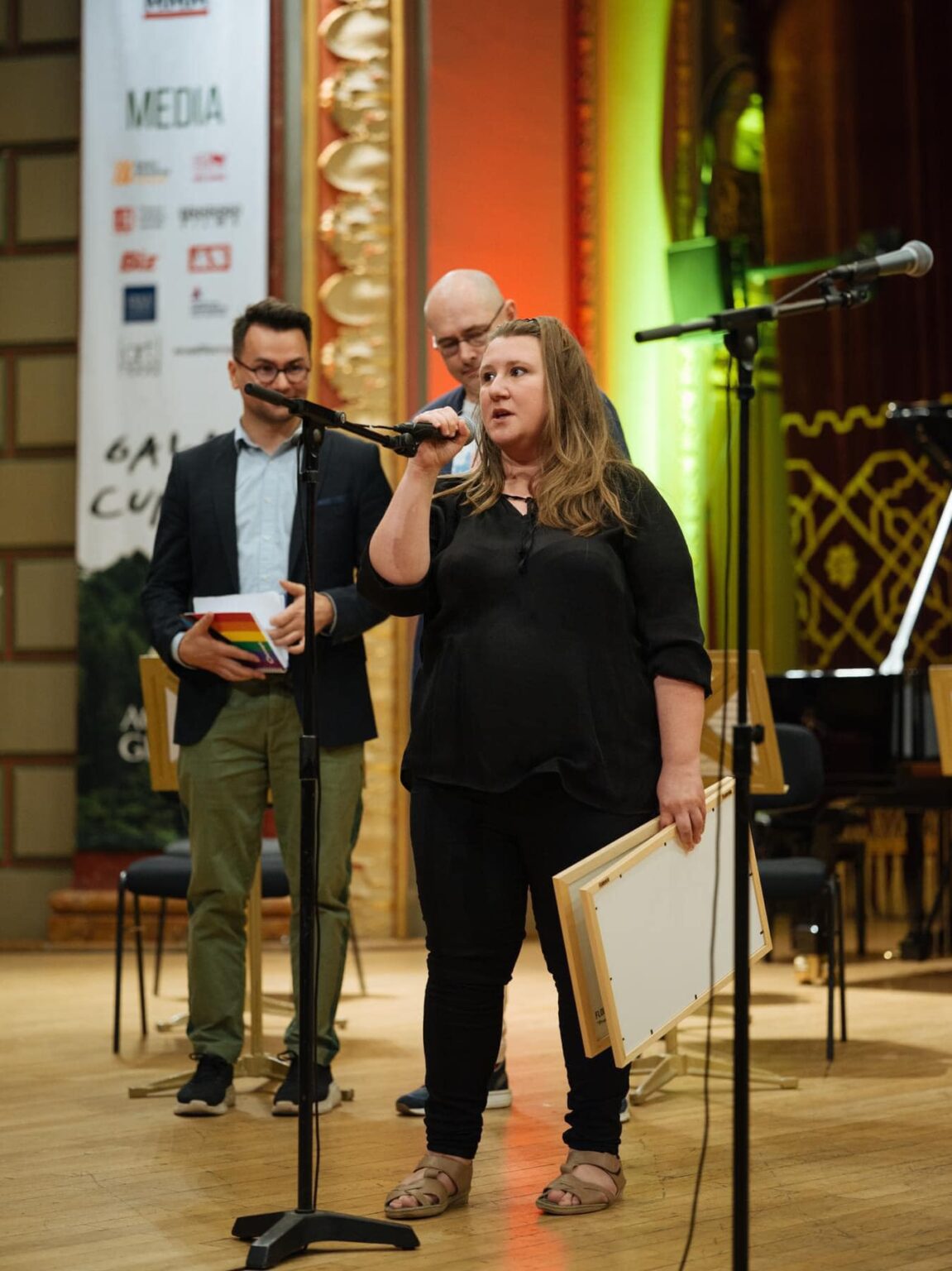
The Romanian LGBTI organisation, ACCEPT plays an important role in co-hosting the ILGA-Europe conference this year. Co-president Teo Ion-Rotaru shares her insights into what the Conference represents for the organisation and the LGBTI community in Romania, in light of the current political climate.
Hi Teo. Can you tell us what hosting the ILGA-Europe Annual Conference means for ACCEPT?
ACCEPT has been part of the European LGBTI movement for almost 30 years. Even though some faces have changed — staff, board members, and activists — our focus remains the same: growing and consolidating the movement. Hosting this conference offers a unique opportunity to contribute to the broader European movement, especially at a time when it is so needed.
It is a chance to bring together young and seasoned activists alike, offering a space where we can collectively reflect on our successes and challenges. My own first ILGA-Europe conference reinforced my belief in the power of community. Seeing others who had been through similar struggles, sharing strategies and support, was a powerful reminder that we are not alone.
What does this event mean in a wider political context for the LGBTI movement in Romania?
The political environment in Romania is tense, with Presidential and Parliamentary elections around the corner. The rights of LGBTI people are increasingly important for Europe, and Romanian politicians are aware that the eyes of Europe are on them.
We hope that this event will serve as a platform to amplify the voices of Romania’s LGBTI community, not just within our own country but across Europe. Hosting this conference sends a clear message: you cannot demand support from Europe while turning a blind eye to the rights denied to your own citizens.
Our fight is intersectional—it’s not just about LGBTI rights, but about democracy, the rule of law, and the well-being of all minorities in Romania. This conference will shine a spotlight on these struggles and push us towards greater equality.
Meet our Annual Conference hosts: MozaiQ – The courage to grow the movement in Romania
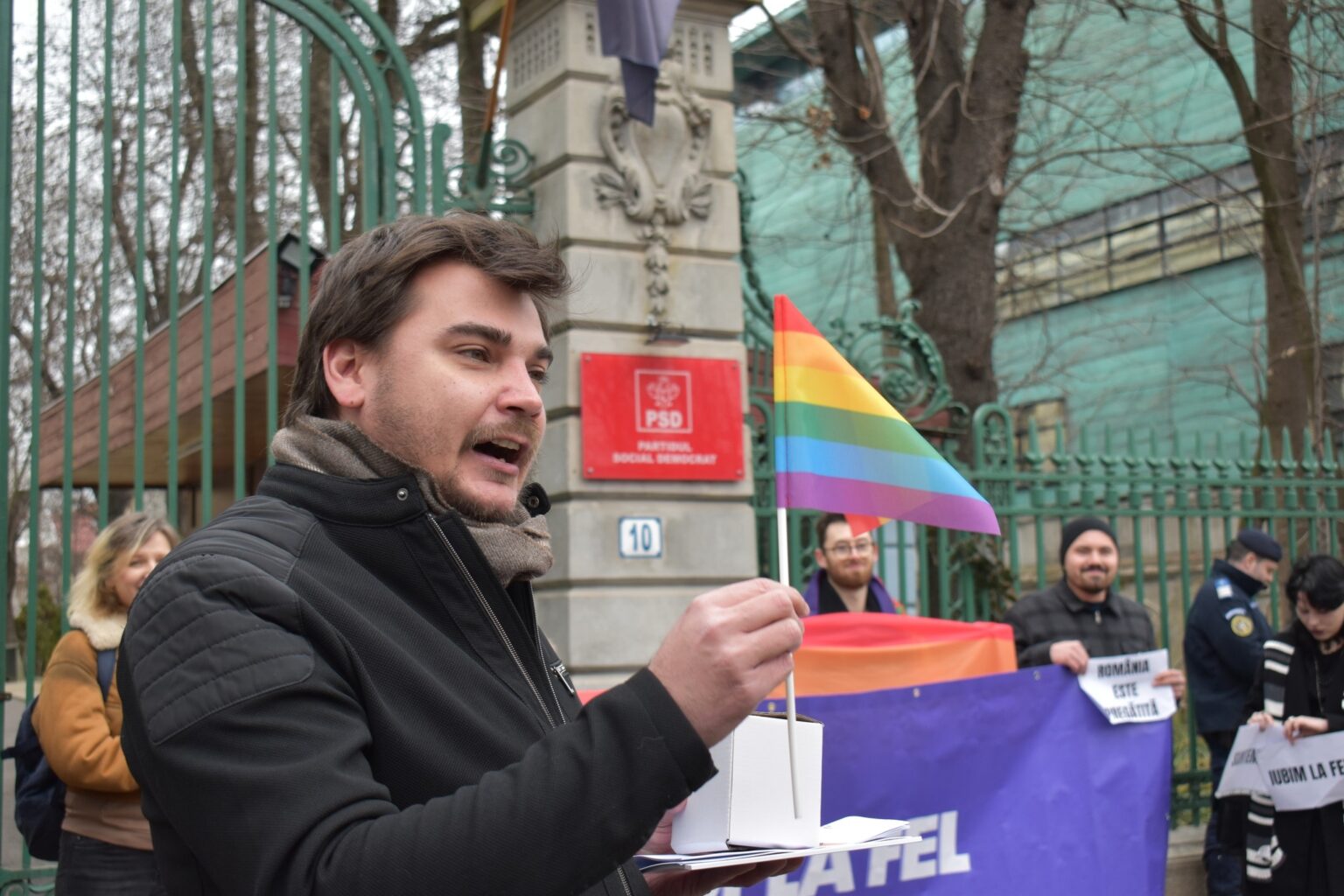
As the ILGA-Europe annual conference approaches, we turn our focus to one of the local co-hosts, MozaiQ, an organisation that has played a crucial role in shaping the LGBTI movement in Romania. Vlad Viski from MozaiQ shares what hosting the Conference means in the context of LGBTI rights in Romania.
Hi Vlad, tell us, what does hosting this conference mean for MozaiQ?
For us, hosting the ILGA-Europe Annual Conference is a testament to the growth of Romania’s LGBTI movement over the last decade. When we started in 2015, there were only one or two LGBTI organisations in the country. Today, there are more than 20 groups, not just in Bucharest but across six other cities. This transformation has been at the heart of MozaiQ‘s mission—building a movement from the ground up, creating spaces for underrepresented groups such as Roma LGBTI youth, transgender people, and the elderly.
The Conference is a reward for our efforts, and it shows that Romania is ready to connect with activists from across Europe. This Conference isn’t just about us; it’s about recognising that our work is worthy and that our movement is mature.
What does this mean in a wider political context for the LGBTI movement in Romania?
Romania’s political landscape has been anything but easy for LGBTI people. In ILGA-Europe’s Rainbow Map, Romania ranks 26th out of 27 EU countries on LGBTI rights, only ahead of Poland. Same-sex couples are not legally recognised, and gender recognition for trans people is an ongoing battle. Recent legal victories, such as defeating the 2018 referendum aimed at banning gay marriage and the 2020 bill that sought to outlaw gender identity education, and the 2024 landmark ruling from the EU Court of Justice affirming the mutual recognition of legal gender identities across Member States, show the importance of continued resistance.
We’ve managed to prevent Romania from following the path of Hungary or Poland, where democracy is being eroded. Our success in stopping these anti-LGBTI measures shows that civil society is strong, but the fight is far from over.
What is in the near future for the LGBTI movement in Romania?
With the upcoming Presidential and Parliamentary elections happening before the end of the year, the ILGA-Europe conference will play a role in keeping Romania’s LGBTI rights on the political agenda. Romania is being watched, and our movement is gaining power not just here, but across Europe. Romania has to stay on its European path. It has to provide a strong policy on legal gender recognition based on self-determination and create an environment in which LGBTI people are protected. It is essential that Romania continues to recognise the rights of LGBTI people as part of its commitment to the European path.
Annual Conference logo launch: The Power of Curaj
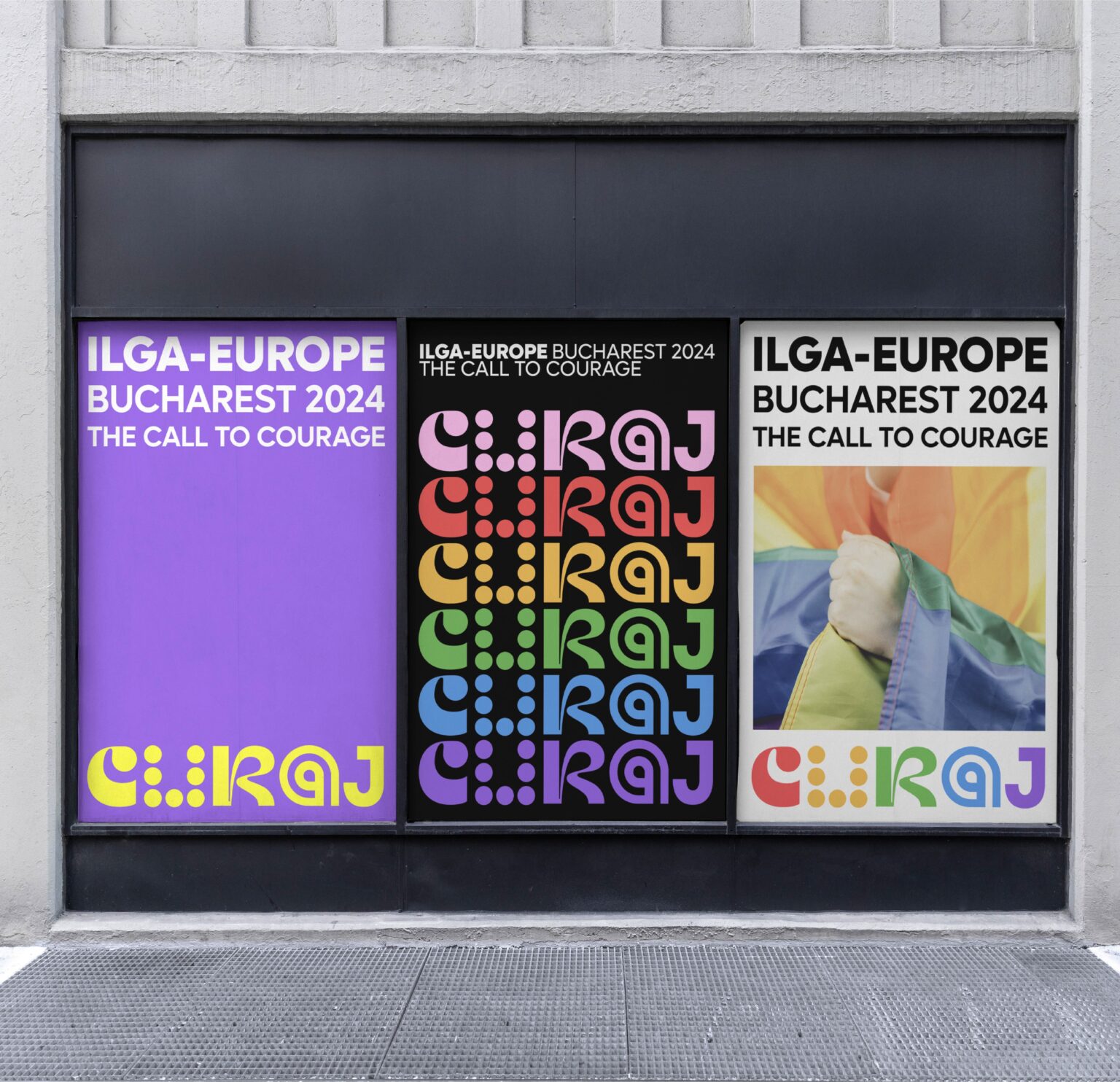
Learn about the courage captured in our branding for this year’s ILGA-Europe conference
As we launch our new logo for the ILGA-Europe conference in Bucharest, we present to you a word used in everyday Romanian life: ‘curaj’. This term, which means ‘courage’, encapsulates our theme this year, ‘The Call to Courage’ and serves as a powerful reminder of the great bravery shown by our activist movement, often in the most challenging circumstances, and the collective courage we need to inspire in each other as we go forward.
Meet the designer
This year’s designer, Vadim Carazan, has been working in design for 12 years in Romania. After years of freelancing, he established his own studio with a team of employees, called wegrow. While he now delegates most of the projects, this was one he chose to undertake himself. When designing, he wanted to challenge himself, since using a word as a logo is considered quite “out of the box” in the designer world.
About the logo
Here is what Vadim had to say about the process of designing the logo:
“Language plays a crucial role in shaping our perceptions and emotions, and the Romanian language offers a unique perspective on courage. The word “curaj” (pronounced koo-rahzh) stands alone as a compelling call to action. In everyday Romanian life, it is commonly expressed in various situations, such as encouraging someone before they leap to the unknown or offering support to someone facing a difficult decision. This cultural resonance transforms “curaj” into more than just a word; it becomes a heartfelt nudge toward bravery and self-empowerment.”
“The design of our logo reflects the essence of ‘curaj’ in its simplicity and strength. Each letter varies in shape and style, symbolising the rich diversity within the LGBTI community – you can be a ‘C’, or a ‘U’, or any other shape and letter! The design celebrates quirkiness, individuality, and the spectrum of experiences that make our community unique. This playful yet meaningful approach represents the importance of embracing one’s identity and self-expression.”
“While ‘curaj’ is deeply rooted in Romanian culture, its message of courage resonates universally within the LGBTI movement. It embodies our shared experiences – standing up for our rights, embracing authenticity, and nurturing a culture of inclusivity. By centring this word in our branding, we not only honour the local context but also highlight our commitment to making connections and empowering activists. This choice serves as a reminder that we are all part of a broader movement, united in our quest for equality and justice.”
Curaj in Bucharest
We are big fans of what Vadim has done with the logo. It represents so clearly every element of the theme of our conference, while rooting it in Romania, where we look forward to being with over 400 activists from October 16-19, hosted by local organisations Accept and Mozaiq. It promises to be a pivotal moment for the LGBTI movement in Europe and Central Asia, as we come together in a vibrant, engaged and courageous space to connect, learn from each other, have great fun, and re-energise for the work ahead.
The ILGA-Europe Annual Conference 2023 in Pictures
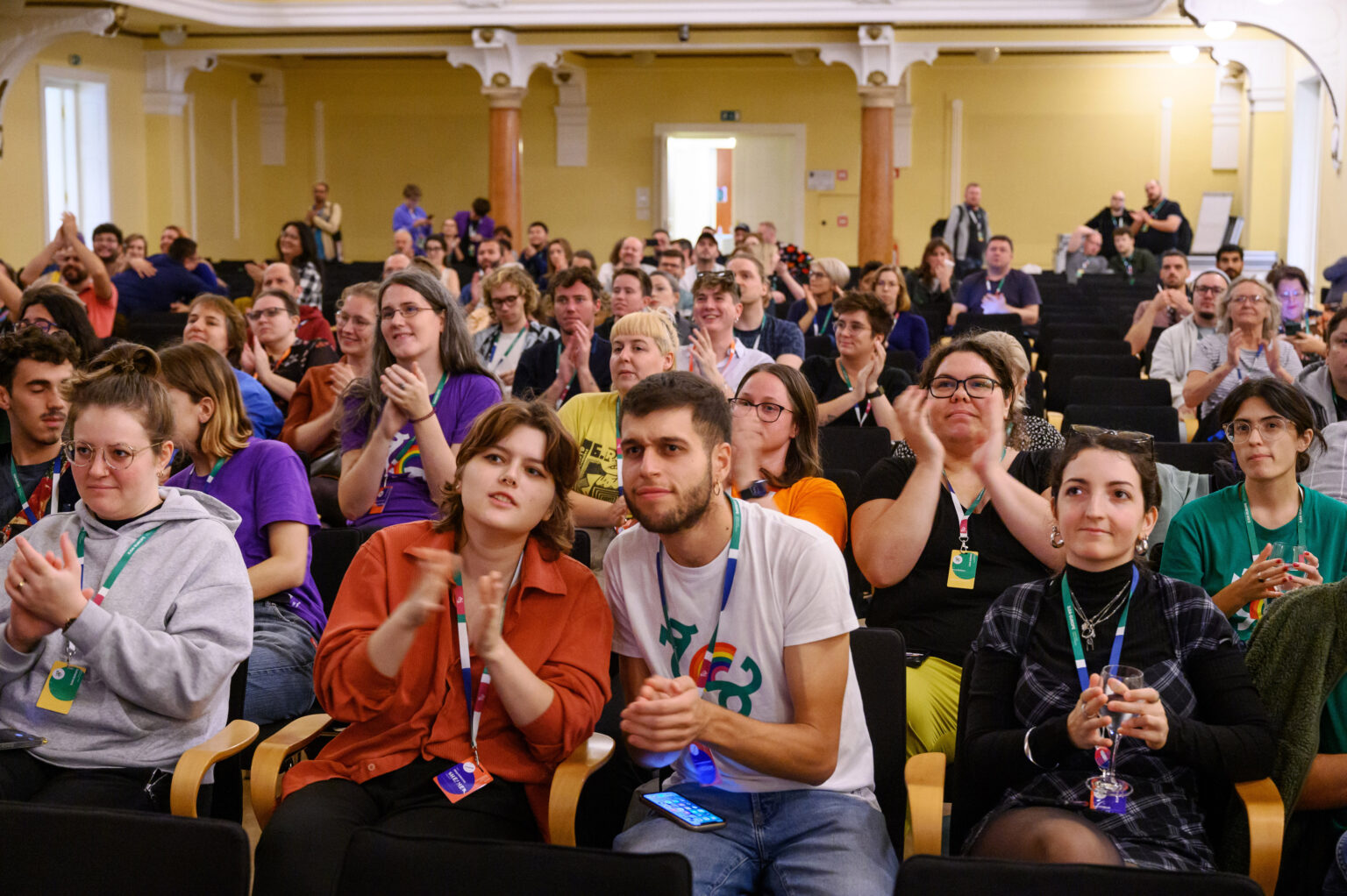
For the four days of our Annual Conference in Ljubljana this year, our roving photographers were there to capture every minute. Here are the highlights!
In October we gathered together with 450 activists from across Central in the Slovenian capital of Ljubljana for the ILGA-Europe for the ILGA-Europe Annual Conference. And what an experience it turned out to be! Four inspirational days of connecting, sharing, thinking, talking, listening, learning, re-energising and building strength for the work to come. There was lots of laughter too, rooted in the sheer, queer joy of being together in such a special and mutually supportive space. And, of course, there was our traditional karaoke, with a host of unforgettable performances! Here we share a visual snapshot of the conference with selected images from our wonderful photographers, Domen and Nada. Thanks again to our host organisations in Ljubljana, Legebitra, Ljubljana Pride, ŠKUC, and TransAkcija!
Creating our Annual Conference logo
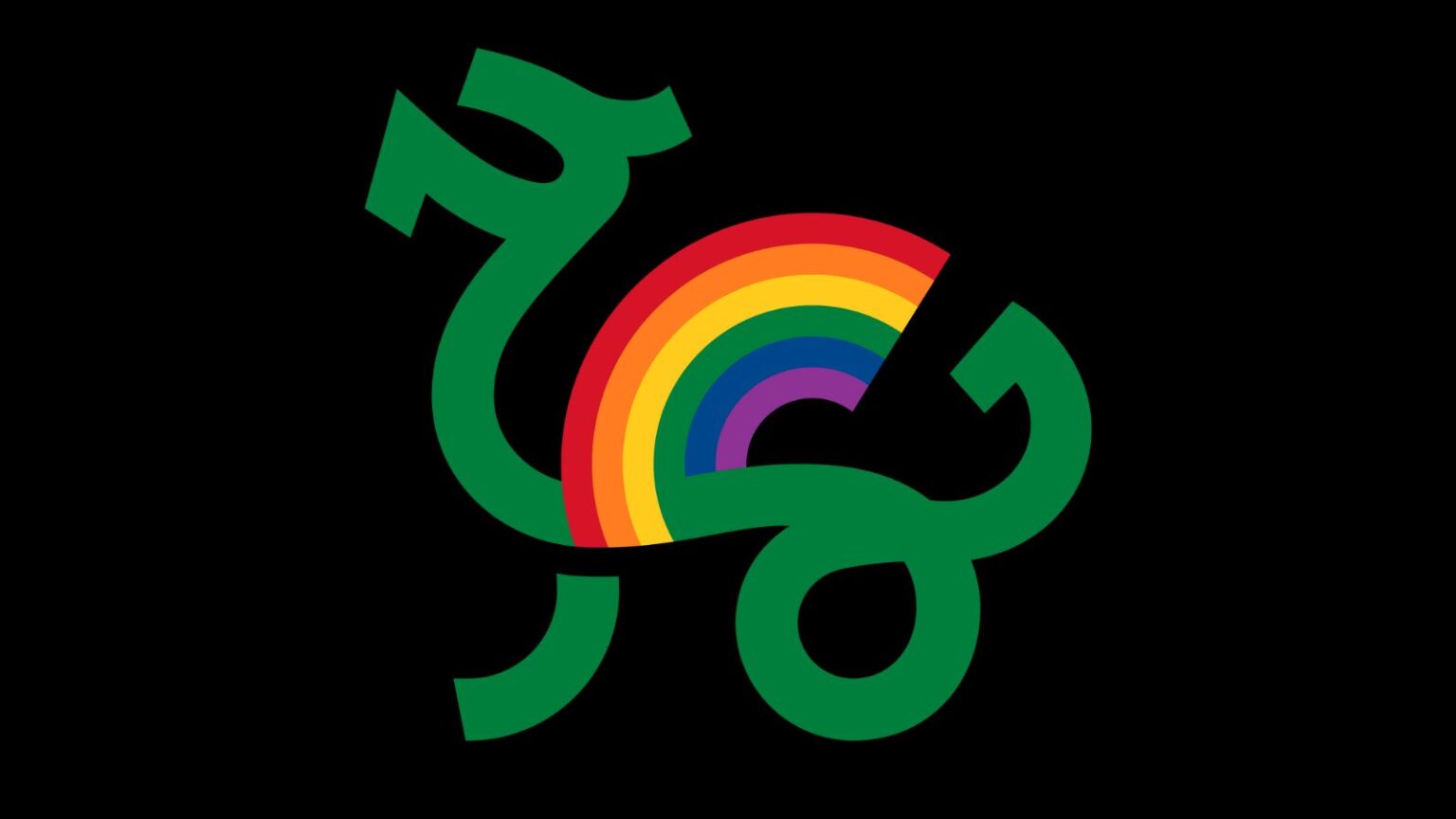
As we get ready for our Annual Conference in October, we’re excited to share the collaborative design process for our Ljubljana 2023 visual identity.
Every year ILGA-Europe bring our Annual Conference to a different city in Europe, and every year we create a new logo to single it out as an important event in its own right, rather than simply another annual gathering of activists. And every year, we begin the work by consulting with our member organisations on what the elements might be that express the identities of the countries and cities our Conference is being held in. We ask them too to recommend designers in the hope that we can source local talent.
Developing the concept
This year we worked with Studio 360, an amazing creative agency in Ljubljana. We asked for a logo that combined a symbol of the city or of Slovenia, which reflected both the strength of our movement and our title for this year’s conference, “Rising To The Moment”. Studio 360 made two proposals for key symbols, one using of the national symbol of Slovenia which is represented on the country’s flag, Mount Triglav, and the other using Ljubljana’s city emblem, the dragon.
Our designer first combined a creative imagining of an existing modern statue of a dragon in Ljubljana, combining colours from the rainbow flag with the dragon’s wings to suggest the LGBTI movement rising.
The second proposal took the peaks of Mount Triglav, combining them with the rainbow colours and a symbol for rising, to again tie in with the conference title.
How we made our decision
Initially we liked the second version of the logo, based on Mount Triglav’s peaks. We felt it was a strong symbol of upwards movement, of ‘rising’, and it’s simplicity appealed to us.
Then we went through a process of consultation, with the Conference organising team and with our hosts. Their feedback was unanimously different. It was felt that the Mount Triglav version of the logo was more corporate than community, that it was harder to really identify the local symbolism, and that it wasn’t as pleasing to look at. It was also felt that the dragon was a more identifiable Slovenian emblem. We went with the feedback and Studio 360 further developed the logo, along with the conference title until we came up with the final design.
We’re really delighted with the final result, which we think both encapsulates the spirit of our Conference this year and represents an iconic, historic emblem of the beautiful city of Ljubljana. We’re looking forward to joining 450 activists from across Europe and Central Asia there this coming October for what promises to be a Conference to remember!
Our Annual Conference 2022: Photo Essay
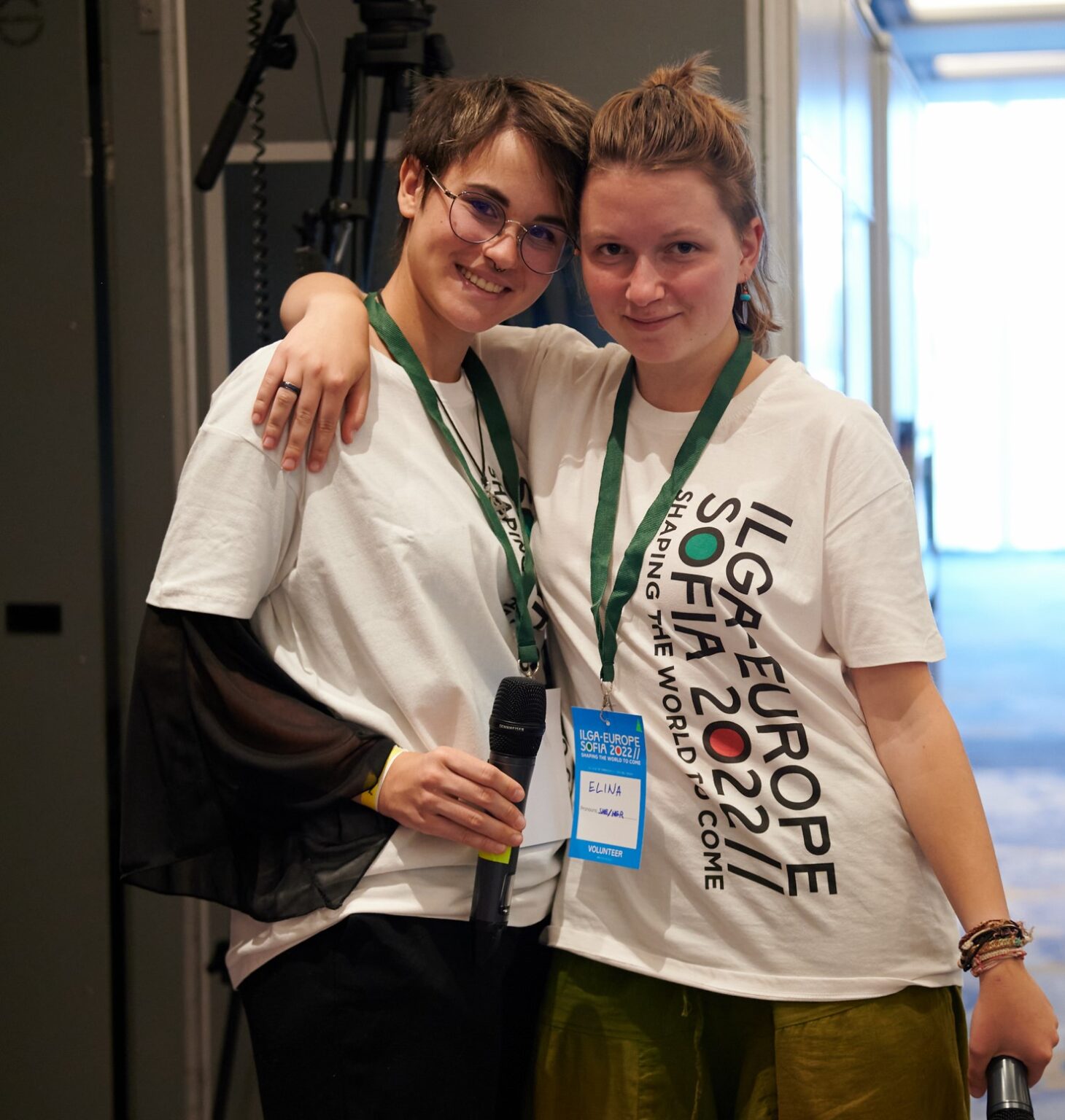
Our Annual Conference was hosted in Sofia by the Bulgarian LGBTI organisations, Bilitis Foundation, Deystvie and Glas Foundation. We would like to thank them for hosting us, and over 350 activists from across the regions ILGA-Europe works with, and a big thank-you also to all the volunteers who helped us keep the conference running so smoothly.
Bringing so many people together for deep and nuanced panels, vital conversations, practical workshops, much-needed networking, meals, entertainment, karaoke and more is no small organisational feat. All of the staff of ILGA-Europe had their roles to play in bringing this all together, but a very special thank-you to Alejandro Hernandez Pulido, Beryl Abols, Anna Shepherd, Nadz, Anastasia Smirnova, and Mehmet Akin for their huge work behind the scenes in the months leading up to the conference, and during our time in Sofia. We, and so many activists, wouldn’t have made it there without you!
Our 2023 conference will take place next October in the Slovenian capital of Ljubljana, and work has already begun to make it another great gathering of brilliant and committed LGBTI activists and their allies. We look forward to meeting you there next October. In the meantime, we hope our photo essay gives a good picture of the time we had together in Sofia this year.
#IESofia2022: Daily Report, Saturday October 22
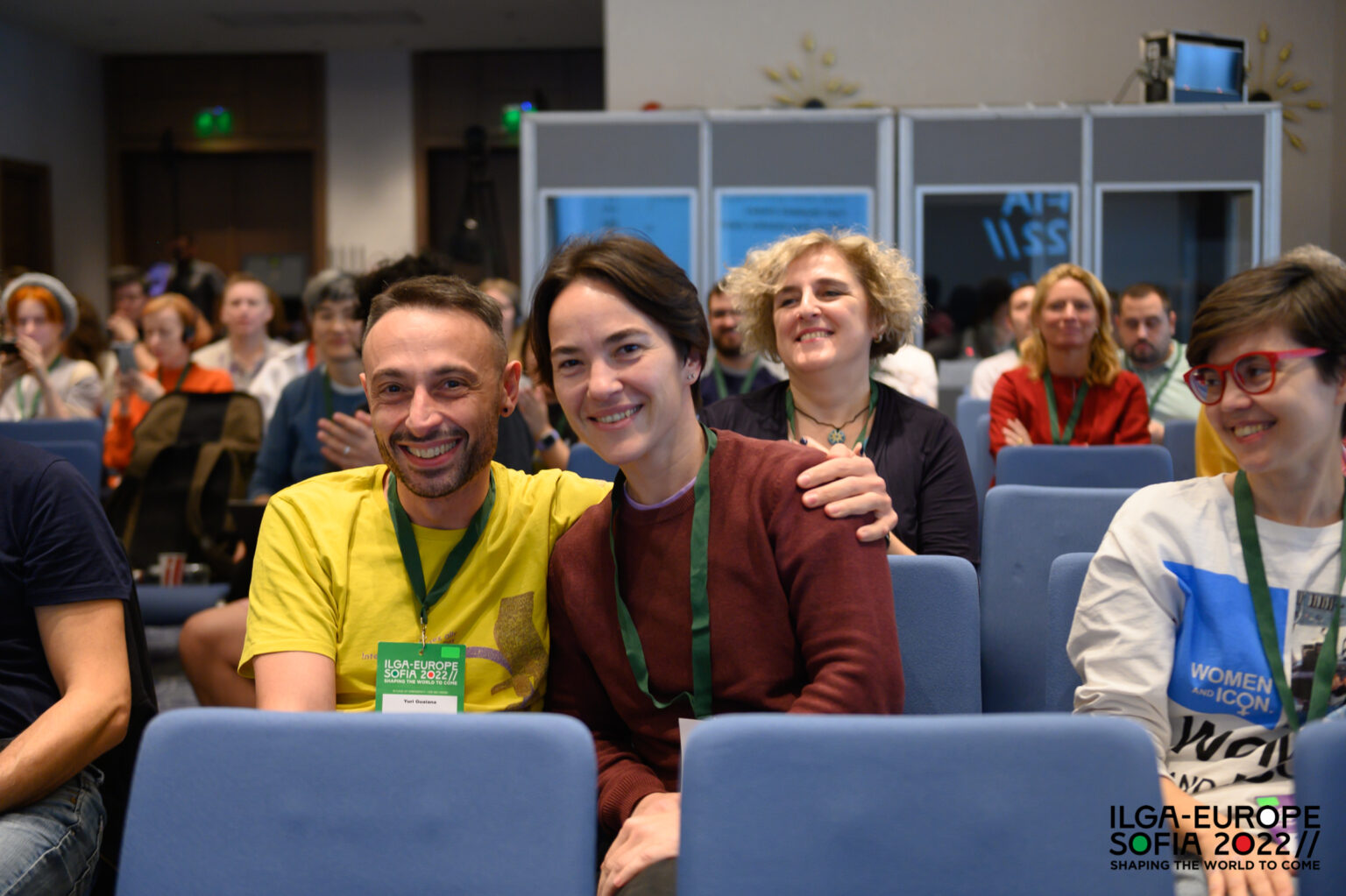
As our Annual Conference sadly comes to an end, over 300 participants enjoyed one last day of workshops and celebrated the election of the new ILGA-Europe board, before the Gala Dinner and one last dance together. Here’s a round-up of the final day!
This morning the breakfast room was calmer than usual. Many activists surely needed some extra sleep after putting their singing and dancing talents to work at our legendary karaoke night last night. The most popular band was Abba, with many of their hits chosen by super-enthusiastic singers, but the song many will remember is the Opus number, Life is Life – for reasons that will only be known to whoever was there!
Still, despite karaoke-induced tiredness, our spirited participants took part in the 13 workshops and applauded with joy at our third and last General Meeting.
The new ILGA-Europe board members, elected during the Conference, were announced: Yves Aerts, Ivan Dimov, Natia Gvianishvili, Xheni Karaj and Zhanar Sekerbayeva join Emina Bosnjak, Mamikon Hovsepyan, Tommy Petersen, Soudeh Rad and Penny Smith will sit on our Executive Board until October 2023. Yuri Guaiana and Olena Shevchenko will be regional representatives at the ILGA World Board for another year, while Rachael Moore, Dan Christian Ghattas, Elias Fjellander, Alina Mirozyan and Sabrina Sánchez will be leading some of the ILGA World steering committees. Finally, we had a chance to say goodbye in person to those leaving or have recently left the board: Yuri Yoursky, Anastasiia Danilova and Darienne Flemington – we will miss you so much!
13 wonderful workshops
Participating LGBTI activists learned about interacting with the media and managing change at their organisations at two four-hour long workshops this morning. At the ‘Drop the Mic’ workshop, participants rehearsed their media game in mock TV interviews with our facilitators and brought home key techniques to apply in their media relations.
In a parallel workshop, participants explored the potential bottlenecks and breaking points that their organisations may go through in face of disruptive events, like those we’ve experienced in recent times. Two-hours self-organised spaces gave the chance for trade union leaders to get together and to discuss how to shape the future by taking care of the past.
Money, money, money must be funny
We sang the Abba hit last night and today activists had the chance to gain some wisdom on funding and partnering with the private sector.
‘Who’s Afraid of Pinkwashing?’ asked COC Netherlands at one of the late morning workshops. In places like the Netherlands, some companies are pulling out of Prides due to criticism of pinkwashing. Companies taking less space at Prides is a good thing, but what are alternative ways of working with the private sector to keep companies engaged and supportive of the LGBTI movement? This workshop navigated these questions through an interactive role-playing exercise where participants wore the hats of company CEOs, LGBTI staff representatives, PR advisors and critical members of the public.
After lunch, the practical hands-on ‘Effective Fundraising Campaigns in Times of Crisis’workshopprovided practical tips for creating fundraising campaigns targeted at individual donors, with activists from Poland and Armenia sharing examples of how they’ve raised funds following hostile developments and in response to crisis.
In the afternoon too, participants had the opportunity to join workshops on anti-NGO laws, building alliances for displaced LGBTIQ Ukrainians and next steps on Ukraine response, queer imaginings and moral panics on trans minors.
We will all soon go back to the places we call home. Gathering together in person after three years would not have been possible without the wonderful support of our local hosts. Big shout outs to GLAS Foundation, Bilitis and Deystvie for enabling these unforgettable days of rich, nurturing and game-changing conversations! See you all in 12 months in Slovenia, if not beforehand!
#IESofia2022: Daily Report, Friday October 21
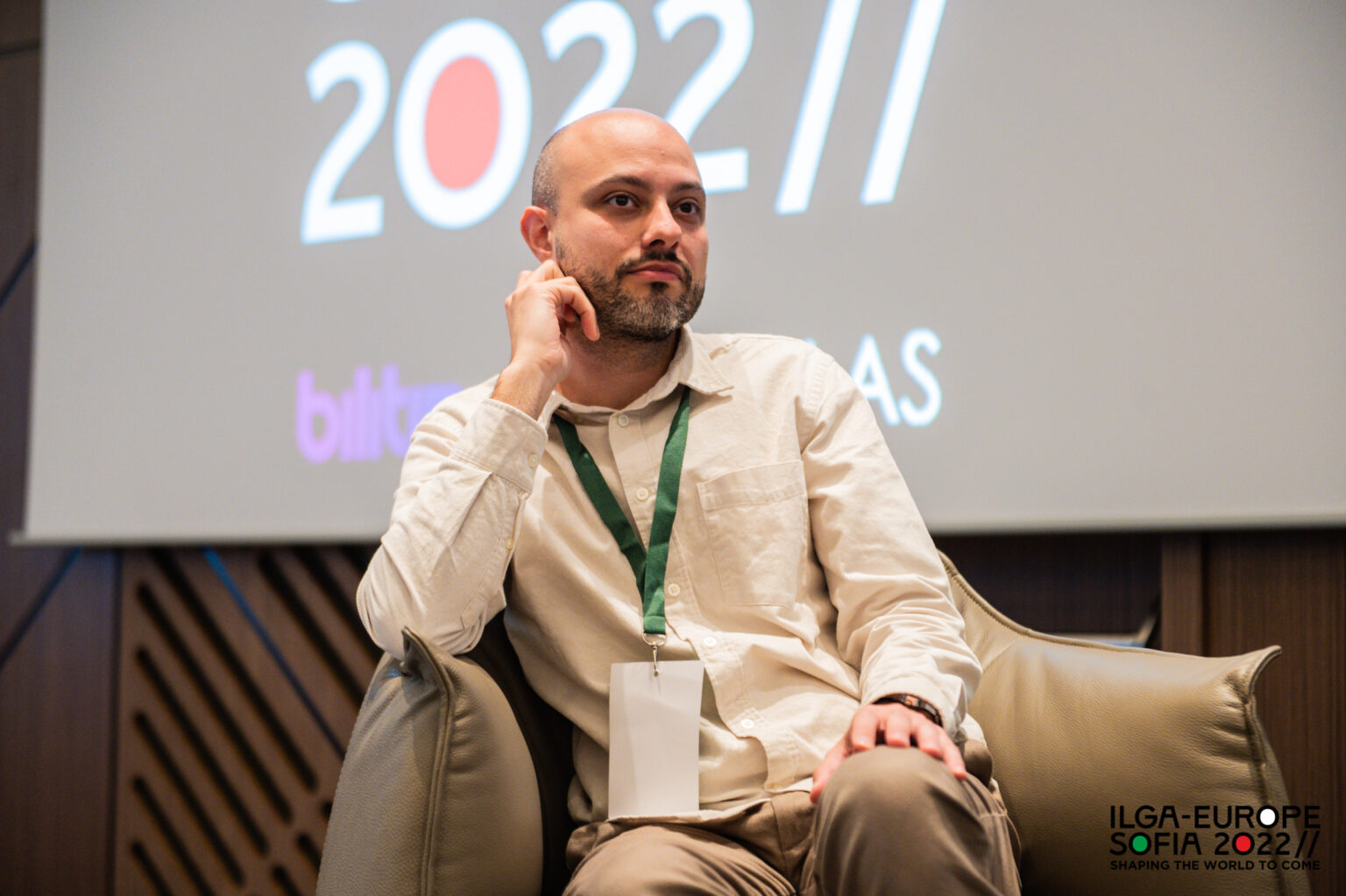
We began the day imagining the future of collective resilience, as part of the work of ‘shaping the world to come’, which is the theme of our Annual Conference 2022. Read our daily report for a snapshot of another day of great panels, discussions, workshops and more!
It was another sunny morning in Sofia as hundreds of LGBTI activists got up and ready for the second day of ILGA-Europe’s Annual Conference. Under this year’s theme, ‘Shaping the World to Come’, LGBTI activists and organisations from across Europe and Central Asia spent a wonderful day, connecting and learning from each other so that we can continue to build our resilient movement.
Kicking the day off, our board member Natia Gvianishvili moderated the second panel of the week. Speakers Dajana Bakić, Operations Manager at Sarajevo Open Centre; Nour Adis, Co-president of Queer Intersection in France; and Radoslav Stoyanov from the Bulgarian Helsinki Committee, discussed and imagined what collective resilience can look like in the LGBTI movement – “or movements” as Natia noted. Collective resilience is the second strand of this year’s Annual Conference and a pillar for LGBTI activism to continue to drive positive change in our societies.
The meanings of resilience
Beginning with the basics, the panel shared their own definitions of resilience. “Solidarity and support among each other, and a safe space where we can share ideas and the sense that you belong, where you will find someone who will find with you – that’s collective resilience for me,” Dajana said.
Resilience also means looking outside of our own spaces and beyond the immediate struggles, Nour explained. “We try to go back to the body and our connection with creativity, to express new and many things. We create magical moments where things can happen outside of our mainstream work, our cities, our usual queer spaces.”
“Resilience for me, in Bulgaria specifically, comes through visibility,” Radoslav explained. At the age of 14, he searched the word “gay” on Wikipedia and found a photo of hundreds of people at a Pride march in New York City.
“This small photograph was very important for me,” he said. “When I first realised I was into guys I was very scared. It was a photograph taken from above and there were so many people. That really helped.”
This is why Sofia Pride is key to LGBTI communities in Bulgaria, Radislav explained. “Sofia Pride gives courage to many. I can see that because each year the number of participants increases.”
Resilience and the politics of joy
Other insights that came from the panel were that ayone can be a stakeholder of LGBTI people’s resilience. Allies can be found among academic researchers who are “shaping the future” too, as well as activists from other movements. Or flexible donors who understand the needs, and state funders that give back to civil society because civil society is doing the work on their behalf. Also, our own networks of families and friends can be helpful in providing resources that LGBTI communities need.
What really came to the fore was that to prioritise resilience, we have bring it back to the basics. After some years living a nomadic life, Nour realised they needed some stability to bring healing to the community. “For our organisation, resilience comes from a place of privilege, because we can take the time to slow down and reflect.”
“It’s important to be aware that we need to build resilience; we need to prioritise and put building resilience it in our schedules,” Dajana said, emphasising the importance of the ILGA-Europe Annual conference in this respect.
“You need to pick your battles”, Radoslav added. “Sometimes you don’t need to react to everything or excessively. If we are always in reaction mode, we are not ready for what’s needed in our communities.”
The panel closed with a reminder to look and celebrate joy daily, but also during the fight for our rights, whether we win or lose. “We are constantly pushed by external actors to focus on trauma, Natia rounded up. “We are not interesting to the external world when we are happy. I think this is what has kept us away from understanding the political importance of queer joy for such a long time.”
Today’s workshops
Towards the end the morning, there was a vital workshop about how humanitarian actors can understand what they need to do for LGBTI communities in a crisis, from providing shelter to translating information in local languages and much more. In parallel, other participants filled the room of the ‘LGBTI Activism in the Face of Judicial Harassment’ workshop, where activists from Poland and Turkey shared their experiences of abuse and harassment in the legal system, which has led some activists to leave activism and even their country.
At the ‘Communicate to Engage the LGBTI Community’ workshop, participants explored the important but often overlooked questions of how we engage our own communities. Key takeaways included the importance of building trust between organisations and communities; making sure communities see themselves reflected back in a positive light; communicating about positive things and not only focusing on negativity; making communities feel involved and giving them a platform; and keeping up to speed on the issues and needs of communities.
The ‘LGBTIQ Equity in the Labour and Homelessness Sector’ workshop proposed creative answers for some of the most vulnerable groups in our communities, including solutions outside the formal systems and informal collaboration. For instance, a participant from Slovenia shared a success story of crisis accommodation for young LGBTI people with individual hosts.
After lunch
After a busy and chatter-filled lunch, Intersex Greece shared their learnings from six-months working with the government leading to the ban of intersex genital mutilation in the country, and results from their ongoing research. At the same time, a mini-panel was held to share experiences of working with institutions against hate crime in Bulgaria, Romania and Georgia, including international court rulings. At the Creating Inclusive Schools workshop, participants got to know more about the School’s Out Project, which aims to create safe environments for LGBTI students, and many other inspiring examples in the education field.
Self-care is a Feminist Issue was the topic of discussion of another activist-led workshop. There, participants brought ideas and experiences setting healthy boundaries at work and in personal relations so we can stay stronger together and remove existing stigma from mental health-related issues.
What leadership means was one of the questions addressed at the ‘Maintaining the Resilience of Teams Providing Support to LGBTI People Facing Crisis’ workshop. Speakers provided varied perspectives, from having different leadership levels to a full horizontal management. “Making decisions under war conditions is extremely difficult,” Olga Poliakova from Gender Stream in Ukraine shared during the session.
Later in the afternoon participants had the chance to learn more about access to healthcare for trans children and teenagers, campaigning in Russia, and a chance to meet the candidates to the ILGA-Europe board and ILGA World board and steering committees over cake and coffee.
To wrap up the day, as we write this blog, participants are gearing up to sing at the now legendary Annual Conference Karaoke. Can you guess what was the hit of the evening? Stay tuned to our channels for tomorrow’s report!
#IESofia2022: Daily Report, Thursday Oct 20
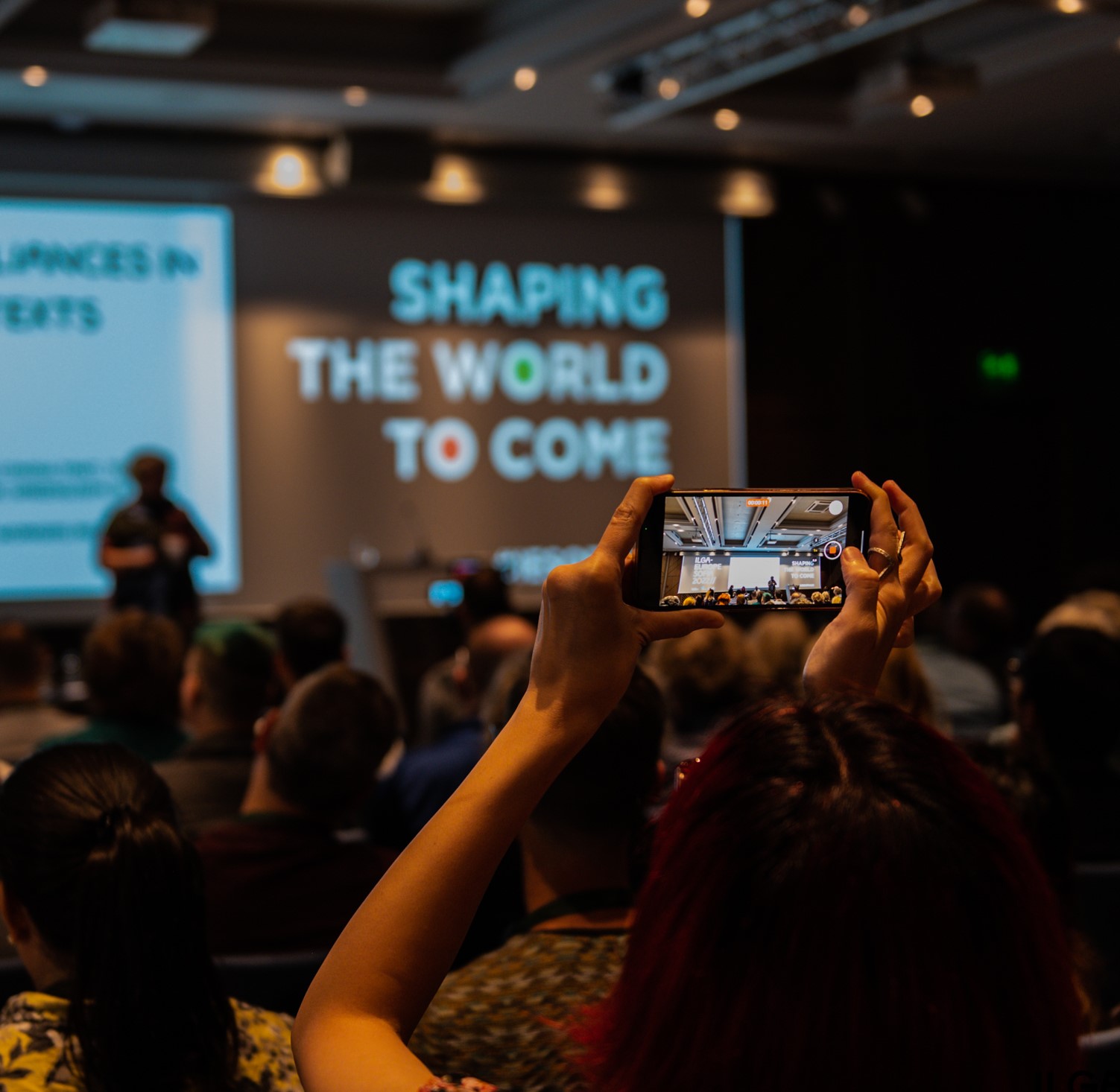
Our Annual Conference has well and truly kicked off in Sofia where hundreds of dedicated LGBTI activists from all over Europe and Central Asia are getting together to discuss ways forward for the LGBTI movement, under the theme ‘Shaping The World to Come’. Here’s what happened on the first day!
Hello from sunny Sofia, Bulgaria, where the whole ILGA-Europe staff, board and representatives of our membership are gathering this week for our Annual Conference. We’ve waited three years to come to this wonderful city, and we’re thrilled to be here!
Today, we had our Opening Session, hosted by our co-chairs Emina Bošnjak and Soudeh Rad, with speeches from Olena Shevchenko, European representative of ILGA World Board and founder of Insight Ukraine; and our Executive Director, Evelyne Paradis. Emina reminded us that the conference is “a place where many connections are made, where we share our experiences, where we learn from each other, and where we build the strength and energy of our movement”.
Since we last met in 2019, the world has changed dramatically – we have gone through a pandemic, and this year the invasion of Ukraine has led to the largest refugee migration within Europe since the Second World War, all while democracy is eroding in some countries and far-right politicians continue to scapegoat LGBTI people and hatred against our communities keeps increasing.
The power inside our communities
“My life has changed completely since the 24th of February, when a full-scale war started in my country. But it took me six months to accept it and to admit it,” Olena Shevchenko told the gathered activists at our opening session. Olena has dedicated herself and her organisation Insight to support LGBTI people staying in Ukraine. She noted that LGBTI people have historically been the target of hate attacks, but at the same time are widely ignored.
“So what do we have, you might ask? We have our power inside our communities because our communities are our families. We know how to support each other. We did it through the centuries… When we are together, not fighting each other, we are the one force which is trying to make this world more human,” Olena said.
Our Executive Director, Evelyne Paradis then took the stage. “The world is indeed going through a time of profound change and our movement has a real and present role as a proactive force in shaping the world,” she said. “LGBTI activists and queer activism have always been at the forefront of driving profound and positive social change. At this conference we want to look at how we continue to empower each other so that the LGBTIQ movement is core to a better future for all.”
Opening Panel: Building alliances in shifting contexts
Our first panel was moderated by Nancy Kelley from Stonewall, with guests Tymur Lysenko, the Ukraine Emergency Response Consultant at TGEU; Annika Ojala, Campaigner with the Greens/EFA party in the European Parliament; and Sabrina Sánchez, Coordinator of the European Sex Workers Alliance. Together they reflected on how we build alliances and work together to respond to crises and counter different anti-democratic and anti-LGBTI forces in ways that leave no one behind.
Tymur spoke about their on-going work with humanitarian institutions in the context of the war in Ukraine, and the importance of building connections based in shared values. “In the early days of the war, I realised that trans people were going to need medicines,” they said. Working in partnership with ILGA-Europe, humanitarian institutions are taking steps forward to provide medical aid to trans and intersex communities. “I want to ask all of you to create as many new contacts as you can, because to build alliances and partnerships you need to know the people, you need to trust them, you need to have shared values, you need to have mutual understanding, and you need to be able to explain to them what you need,” Tymur added.
For Sabrina, to be an ally is to know where is your place. “You can be a sex worker and still oppress other groups, also when you are a part of an oppressed group yourself”. She shared one ESWA recent achievements that happened precisely because different alliances striving from sex workers’ different identities. 200 sex workers made history by “occupying” the European Parliament for the first time. “Usually when you are a sex worker, politicians make laws for you without you, just how it used to happen with LGBTI communities. But with these alliances we are showing that we know how to work together.”
“Alliance to me is survival and the embodiment of our values,” Annika said, “so that we are not only fuelled by anger but by love.” She shared learnings from working with activists at the intersections of the LGBTI and climate movements and raised the need to decolonise the climate movement so that climate change is no longer seen as a problem of the future but one of the present, and indigenous communities can regain a place at the table. Alliances can come also from within a movement, Annika remarked, when reflecting about how to find common narratives. “Intergenerational collaboration has worked very well in the past for the climate movement.”
Sabrina spoke about how cross-movement alliances are incredibly important for the advancement of all, but that we have to be in alliance while respecting and understanding our allies. “One hundred and seventy sex workers took the French government to the European Court of Human Rights for the blanket criminalisation of our work,’ she explained. ‘We built this case with the help and input of other organisations. Allianceship is knowing your place in the struggle of our ally.”
Today’s workshops
After the first General Meeting, with welcoming videos from European political representatives Helena Dalli, Didier Reynders and Christophe Lacroix, the first workshops began. Participants could choose between learning from the experiences of LGBT people in Ukraine; working in groups to explore ways of continuing LGBTI activism amidst anti-LGBTI noise, where some pointed towards the importance of finding atypical allies. Finding the narratives behind the messages and picking your battles were among other key elements of the work identified. The parenthood recognition workshop reminded participants that there is an on-going battle for all rainbow families across the region; and at the workshop on inclusive migration and asylum policies in the EU, the needs other than solidarity were discussed, as well as the need to reflect on who has access to asylum and who has been left behind.
Later in the afternoon, the conference was packed with more workshops: Alliance Building in Religious Contexts, where activists shared their learnings of Christian LGBTIQ+ groups at the gathering of over 350-member church representatives from all over the world in Germany earlier this year; Building Bi+ Alliances tried to identify what can LGBTI+ organisations in Europe and Central Asia do to improve the lives of bi+ people; at the workshop on LGBTI rights in Bulgaria, participants learnt more about key litigation cases led by activists in the country through European courts, which are yet to be implemented; at Transforming Alliance, participants discussed barriers and solutions to advance the human rights of trans people; and finally, activists led a workshop on public health and human rights.
We ended the day playing board games and watching films, before recharging our batteries for Friday, where more panels, workshops, and powerful exchanges will be taking place at our Annual Conference. Watch this space for the day’s report!
Annual Conference 2023: Location Announcement
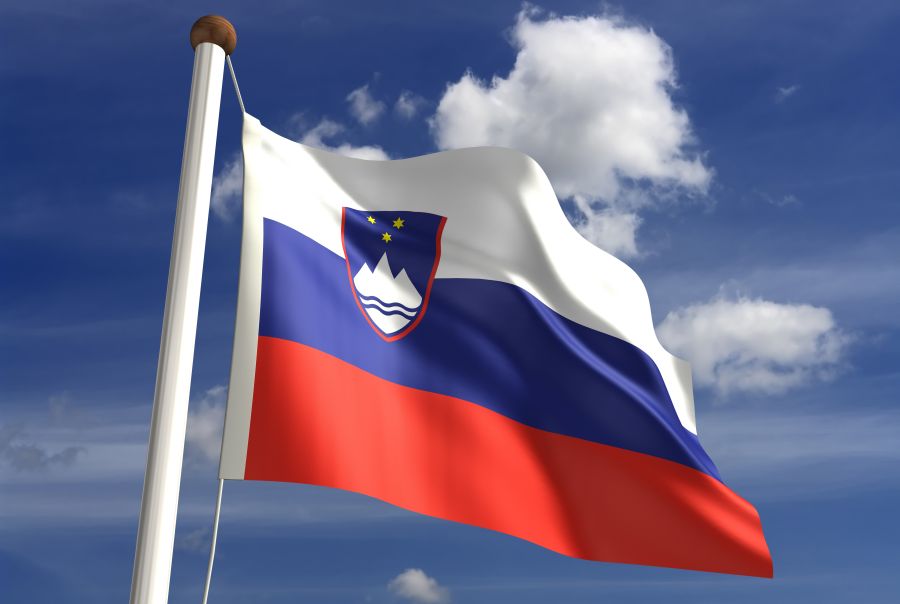
As we get ready to travel to Bulgaria for the ILGA-Europe annual conference in Sofia this week, we’re delighted to announce that the city for next year’s conference has been chosen.
The 24th Annual ILGA-Europe conference will take place in the Bulgarian capital of Sofia this week, from October 19-22, where 350 participants, alongside our staff and board members, will attend workshops, plenaries and activities all under the theme, ‘Shaping the World to Come’.
Excited as we are to be meeting with activists again in person, after a two-year hiatus, we’re also delighted to announce that the Slovenian capital of Ljubljana, in the heart of Central Europe, has been chosen as the location for our Annual Conference in 2023.
We’re looking forward to beginning our work with LGBTI host organisations in Ljubljana to organise the 25th ILGA-Europe Annual Conference, and we’ll be announcing the exact dates as soon as they are tied down.
In the meantime, we look forward to being with our host organisations in Sofia – Bilitis, Deystvie and Glas Foundation – to share the energy, connection, learning and laughter of the ILGA-Europe annual conference once more!
Meet Simeon from the Bulgarian organisation, GLAS Foundation, co-host of our Annual Conference
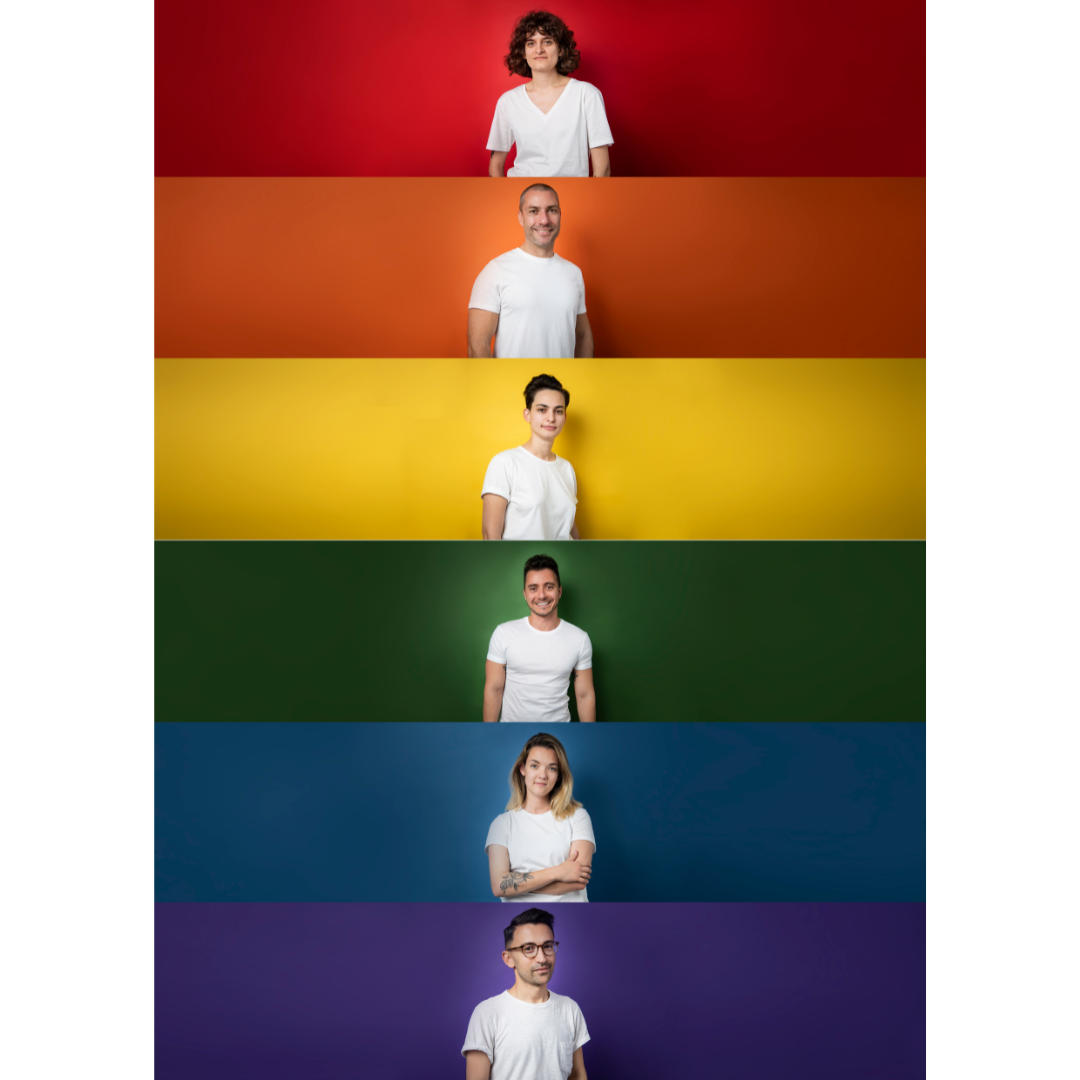
Simeon Vasilev, Chairman and Co-Founder of GLAS Foundation, one of the three Bulgarian LGBTI organisations co-hosting the ILGA-Europe Annual Conference in Sofia this month. Here Simeon talks about the recent elections in Bulgaria and what the possible outcome will mean for LGBTI people in the country.
“We are hoping that this gathering will help to put a focus on Bulgaria.”
Simeon Vasilev
Hi Simeon! Can you tell us what it means for your organisation to co-host ILGA-Europe’s Annual Conference in Sofia this year?
Beyond the great honour of being a host country for a second time in ILGA-Europe’s herstory, we are hoping that this gathering will help to put a focus on Bulgaria. Despite being part of the EU for so many years, we are drastically behind many other member states when it comes to legal protection and rights. For GLAS foundation, which I lead, it’s also a great opportunity to elevate our skills and competences and broaden our networks. We are glad to have a chance to put into practice so much of what we have learned from organising large scale events like Sofia Pride in the last couple of years. It also means strengthening our relationship with ILGA-Europe and not least – another great work flow with your team!
“This period of time has made the local LGBTI community more politically engaged.”
Simeon Vasilev
Originally, the decision to celebrate the Annual Conference in Sofia was made in 2019 but it was postponed it for well-known reasons. What key changes or events have taken place for the LGBTI movement and communities in Bulgaria ever since?
The major key change during that time has been the political environment. In 2021 alone, we had four elections. Again, this month another national election took place. It’s a constantly changing political flora and fauna, but I do believe it’s for the good. During that time our community centre – the Rainbow Hub, which we run with Bilitis foundation, was physically attacked by a far-right political candidate. We were later kicked out of the premises by other landlords.
However, the response of the local and international community was heart-warming. We managed to secure a new place with the donations we raised. I also think this period of time has made the local LGBTI community more politically engaged, which we have been advocating for a long time. It should be noted that in 2019 we had around 3,500 people at Sofia Pride, and this year we had over 12,000. This number alone speaks loudly for the recent progress during the last two or three years.
The GERB party has won the parliamentary elections and they will form a coalition. How do you expect this will affect LGBTI people’s rights and communities and organisations?
The GERB party have been silent or complicit to nationalist parties in the past and I don’t expect a major shift to happen among their leadership. It will be far more alarming if they make a coalition with the fourth party in votes – the ultranationalist, anti-EU and anti-Western Revival (Vazrazhdane). This would be a wake-up call for their EU political partners. I’m cautiously optimistic that the democratic liberal parties, second and sixth in the last elections, will be more vocal on the LGBTI rights.
The ILGA-Europe Annual Conference takes place in Sofia, Bulgaria from October 19-22. To learn more about Glas Foundation, visit their website here.
Meet Denitsa from the Bulgarian organisation Deystvie, co-host of our Annual Conference
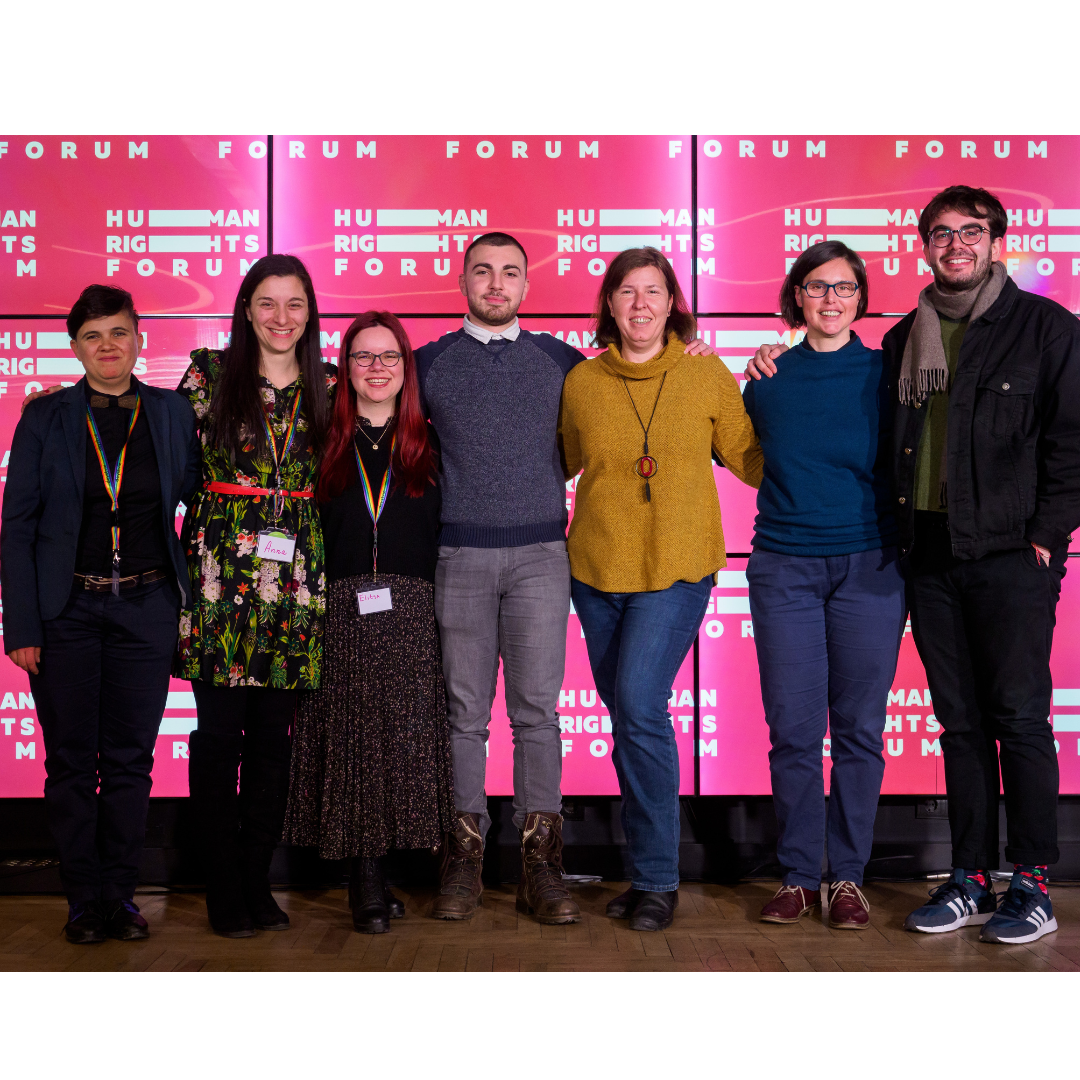
Denitsa Lyubenova is co-founder of Deystvie, one of the three Bulgarian LGBTI organisations co-hosting the ILGA-Europe Annual Conference in Sofia this month. Here Denitsa talks about the recent elections in Bulgaria and what the possible outcome will mean for LGBTI people in the country.
Our Annual Conference is almost upon us, and this year it will place later in the Bulgarian capital of Sofia. The conference is a very much needed moment of connection and empowerment for the LGBTI movement in Europe and Central Asia, as we have not been able to get together in person since 2019. We can only do this thanks to the support of the three Bulgarian organisations who will be hosting us all, Bilitis, Deystvie and Glas Foundation.
In this blog, Denitsa Lyubenova, lawyer and co-founder of Deystvie, tells us about what it means to co-host ILGA-Europe’s conference, what the key developments have been for Bulgarian LGBTI communities and organisations in recent years, and what they expect from the government elected this month, on October 3.
“For Bulgaria this will be the biggest LGBTI event of the decade, of the millennium and we’re really looking forward. We are working a lot to make it happen.”
Denitsa Lyubenova
Hi Denitsa, tell us, what does it mean for your organisation to co-host ILGA-Europe’s Annual Conference?
I think it’s a great opportunity, not only for our organisation and to show our work, but also to show the problems the community in Bulgaria face. And I think all the participants, people from Europe and Central Asia, International guests, politicians, donors and the media will basically feel what we experience here on a daily basis.
For Bulgaria this will be the biggest LGBTI event of the decade, of the millennium so far, and we’re really looking forward to it. We are working a lot to make it happen!
Originally, the decision to celebrate the Annual Conference in Sofia was made in 2019 but it was postponed it for well-known reasons. What key changes or events have taken place for the LGBTI movement and communities in Bulgaria ever since?
At the moment, the three organisations Glas, Bilitis and Deystvie are working together very closely. Each organisation is putting on a lot of events. For example, Deystvie has organised a couple of round tables with institutions. Also, since last year, we’ve been organising something that we’re very proud of, called Sofia Human Rights Forum. It’s not only an LGBTI related event. It concerns human rights as a whole and rule of law, not only in Bulgaria, but also for those who grew up here. It also touches base with human rights violations and opportunities all across the European Union. We had this event in March this year, with people talking about LGBTI rights and gender equality from Poland, the UK, and from Bulgaria as well.
“We need a stable government in order to work with it, in order to achieve more sustainable legislative changes.”
Denitsa Lyubenova
The GERB party has won the parliamentary elections and it is reported that it will form a coalition. How do you expect this will affect LGBTI people’s rights and communities and organisations?
Well, we’re still not sure if GERB will form a coalition, but if that happens, it will definitely not be with the pro-liberal and pro-democratic parties in Bulgaria, which took a stand for the LGBT rights in the last couple of elections.
I’m not very an optimistic person. My understanding is that if GERB forms a coalition, it will be with the far-right political party, Revival. But we’ll see. By the time the conference happens, we will know whether GERB will form a coalition or if we’ll have another election.
It’s a very difficult situation. Bulgaria has been in a political crisis for a year and a half. This prevents our work because we need a stable government to work with to achieve more sustainable legislative change. Withoug having a government in place, it’s very difficult for us to navigate these changes.
During the last six months, with the last government Bulgaria had, the Deystvie team managed to be part of a working group with the Ministry of Justice in order to amend the criminal code of Bulgaria, and we were very happy about this. We made a very big step forward for the LGBT rights in Bulgaria, especially in hate crime legislation. However, the government fell and as a result the amendment of the criminal code was not voted on in parliament.
Also, we’re looking forward for the implementation of the Baby Sara case. The lack of government prevents us from getting the judgment of the Court of Justice of the EU, recongising Baby Sara and her same-sex parents, implemented. At this rate, I think we’re going to have Granny Sara before she gets her rightful citizenship in Bulgaria.
The ILGA-Europe Annual Conference takes place in Sofia, Bulgaria from October 19-22. To learn more about Deystvie, visit their website here.
Meet Lilly from Bilitis in Sofia, co-host of ILGA-Europe’s Annual Conference
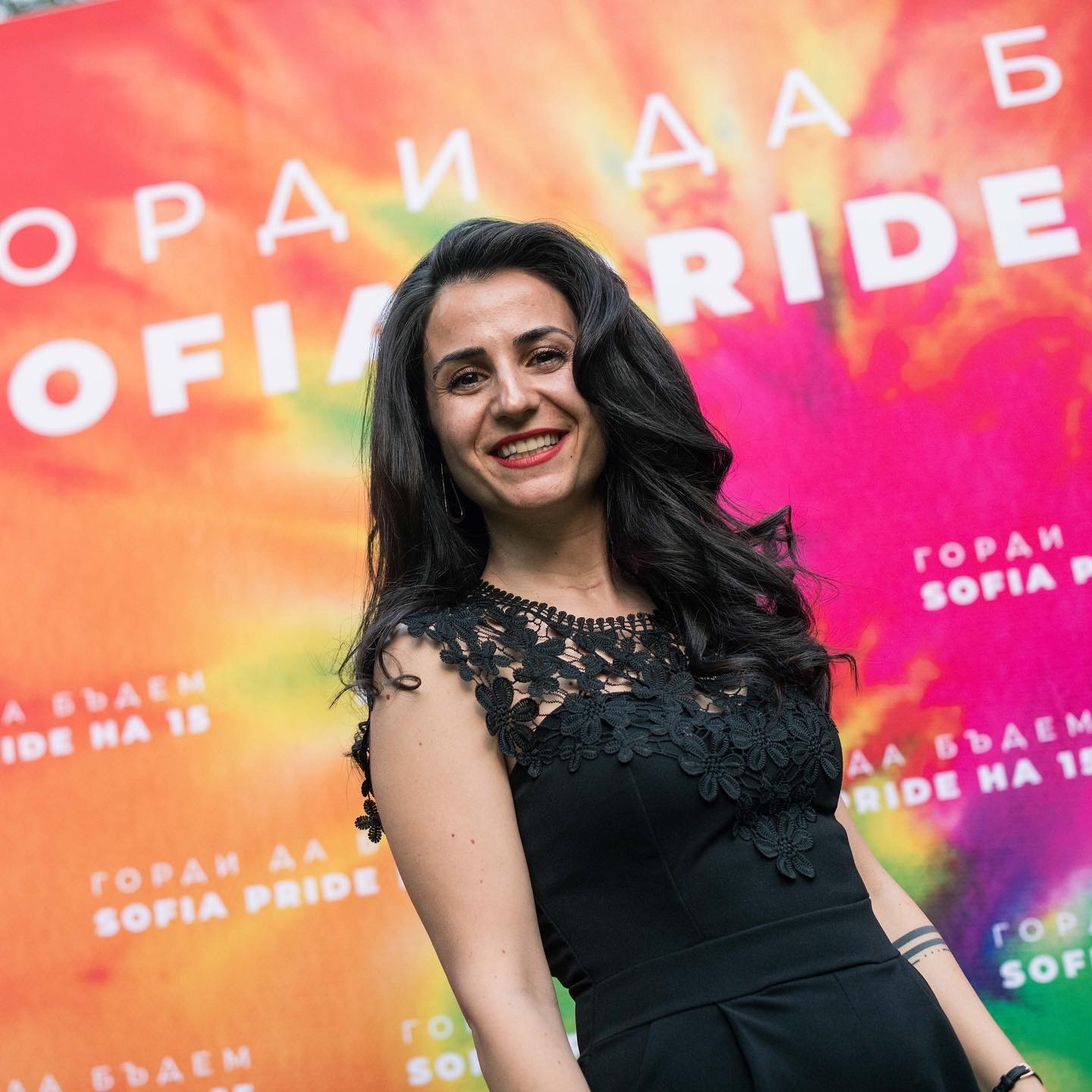
Lilly Dragoeva is the Executive Director of Bilitis, one of the three Bulgarian LGBTI organisations co-hosting the ILGA-Europe Annual Conference in Sofia this month. Here Lilly talks about what it means to have the largest European LGBTI activism conference in her country.
We are almost ready for our Annual Conference, which will place later this month in Sofia. The conference is a very much needed moment of connection and empowerment for the LGBTI movement in Europe and Central Asia, as we have not been able to get together in person since 2019. We can only do this thanks to the support of the three Bulgarian organisations who will be hosting us all, Bilitis, Deystvie and Glas Foundation.
In this blog, Lilly Dragoeva from Bilitis, tells us about what it means to co-host ILGA-Europe’s conference, what the key developments have been for Bulgarian LGBTI communities and organisations in recent years, and what they expect from the government elected this month, on October 3.
“Hosting the biggest European political LGBTI event inevitably puts pressure on local politicians and institutions to finally take a step in advancing LGBTI equality.”
Lilly Dragoeva
Hi Lily, can you tell us what it means for your organisation, Bilitis, to co-host ILGA-Europe’s Annual Conference in Sofia?
Bilitis is proud to be one of the co-hosts of the conference and we are excited to welcome activists from all across Europe and Central Asia! Bilitis is the oldest active LGBTI organisation in Bulgaria but we weren’t part of the hosting team of the first ILGA-Europe conference in Sofia, back in 2006. So, we see this as a great opportunity to shed a light on the situation in Bulgaria and our work, especially in the last few years when we see an organised effort to attack and scapegoat the LGBTI community in the country.
At the same time, hosting the biggest European political LGBTI event of the year in Bulgaria’s capital inevitably puts pressure on the local politicians and institutions to finally take a step in advancing LGBTI equality – something that is much needed and long overdue. It is also a wonderful occasion to reconnect with friends and colleagues from all over and remind ourselves how energising it is to be physically together, exchanging ideas, sharing struggles, laughing, crying, dreaming.
And last but not least, we hope that this event will inspire and empower the Bulgarian LGBTI community to be relentless in demanding justice and equality for all.
“It’s no surprise that the increased visibility of the topic also led to an increase in threats and attacks on the community.”
Lilly Dragoeva
Originally, the decision to celebrate the Annual Conference in Sofia was made in 2019, but it was postponed it for well-known reasons. What key changes or events have taken place for the LGBTI movement and communities in Bulgaria since then?
There have been quite some changes over the last three years. The visibility of our work and the visibility of the LGBTI community has significantly increased as a result of the ongoing efforts of the LGBTI organisations, non-formal groups, activists and artists, and our partners. On the one hand, this has led to a greater number of allies and supporters to the cause – from other civil society actors, and through businesses, to more and more Bulgarian citizens. This can be seen in the number of projects and initiatives that are taking place all year around and most evidently at Sofia Pride, which gathered a record number of over 12,000 participants in June this year. We can definitely see and feel that the levels of societal acceptance are increasing.
At the same time, with visibility comes a greater level of negative reactions. The phrase “do whatever you want, just don’t show it publicly” is still widespread. It’s no surprise that the increased visibility of the topic also led to an increase in threats and attacks on the community.
In 2021 we witnessed an unprecedented organised attack on the LGBTI events and spaces around Sofia Pride, which was taking parallel to the second parliamentary elections campaign. Far-right actors attempted to capitalise on the situation. Vandalising spaces, provoking participants, using hate speech and intimidating LGBTI people was an everyday event in May and June 2021.
The situation de-escalated to an extent in the autumn, but on October 30 our community centre, Rainbow Hub was attacked and destroyed, and my colleague Gloriya was physically assaulted. This put us into an entirely new situation of threat and fear for the physical safety of activists and community members. At the same time, there was a really strong wave of solidarity coming from many groups in the society, including politicians, which showed that Bulgarians still refuse to tolerate acts of brutal aggression, regardless of who the victims are.
The GERB party won the parliamentary elections this month and reports say they will form a coalition. How do you expect this will affect LGBTI people’s rights and communities and organisations?
First of all, I’m not sure they will form a coalition because the situation in the parliament is pretty uncertain and almost all political parties have declared that they will not join a government led by GERB. If this is the case, then they will not have a majority, and even if they form a minority government, it will be very unstable. In that scenario there will be another round of elections, the fifth in less than two years, which will be catastrophic not only for LGBTI people but for the country as a whole.
However, should GERB come to power, I expect nothing good for the LGBTI community. They have been in power for more than 12 years and we saw that there were no advancements regarding LGBTI rights whatsoever, regardless of the ongoing efforts from the civil society and despite of the numerous recommendations from international and intergovernmental organisations. So, should GERB come to power, I expect a continuation of their “don’t ask – don’t tell” policy, which means LGBTI organisations and activists will continue to be left without a seat at the table.
This is extremely harmful as it creates a notion that LGBTI people don’t deserve to participate in public life in Bulgaria, or that LGBTI people are just a small group of noisy people demanding special rights and privileges. Let’s not forget that it was GERB who refused to ratify the Istanbul Convention in 2018. GERB allowed their far-right coalition partner VMRO and other actors to spread disinformation about the so called “gender ideology” and to scapegoat the LGBTI community for political gains.
The ILGA-Europe Annual Conference takes place in Sofia, Bulgaria from October 19-22. To learn more about Bilits, visit their website here.
Theme for the ILGA-Europe 2022 Conference Announced.
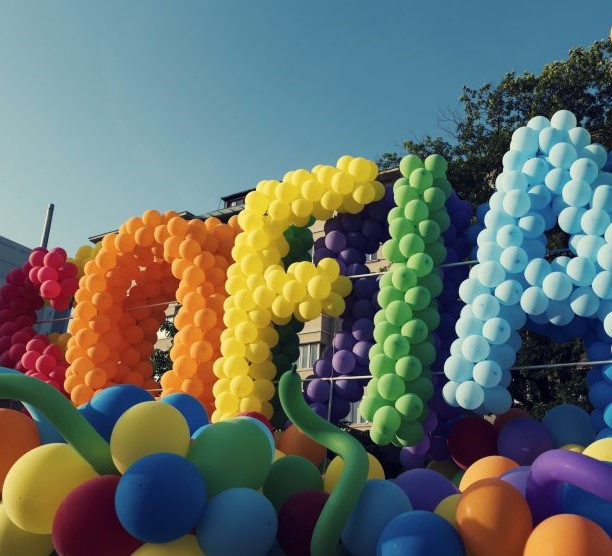
As ILGA-Europe gears up in the organisation of our Annual Conference, which takes place in Sofia this October, the theme ‘Shaping the World to Come’ has been announced
The theme for the 2022 ILGA-Europe conference will be ‘Shaping the World to Come’. This has been identified by the staff and board of ILGA-Europe at a moment in history when change is taking place so many diverse levels, and when the LGBTI movement needs to clarify its power and position in the evolving world.
With climate change, mass migration, the rise of right-wing populist forces and the exploitation of the digital world, politics have become ever more polarised and divided, based on the shaping of carefully constructed narratives rather than facts. Amid this, the stakes are high for the rights, freedom and equality of marginalised groups.
According to Executive Director of ILGA-Europe, Evelyne Paradis, “The change we are going through is being shaped by those in power. One of those powers is a long-standing, cohesive, forward-thinking, organised and active LGBTI movement, who alongside allies across the human rights arena, has been core to shaping a better society for all.
“Our place at the table in shaping the world to come is essential, but there are questions we need to ask ourselves as we go forward. How do we secure our place at the table? How do we ensure those who are never given a place at that table are included in shaping our world? How we continue to be empowered in solidarity and alliance, and how do we continue to empower others, so that the LGBTI movement is core to a better future for all?”
These questions will be integral to a rich programme of plenaries, workshops and talks that will take place at the conference in Sofia this coming October, organised and led both by ILGA-Europe staff and member organisations.
To find out more about this year’s ILGA-Europe conference, click here.
What We Learned at Europe’s Largest Online LGBTI Conference
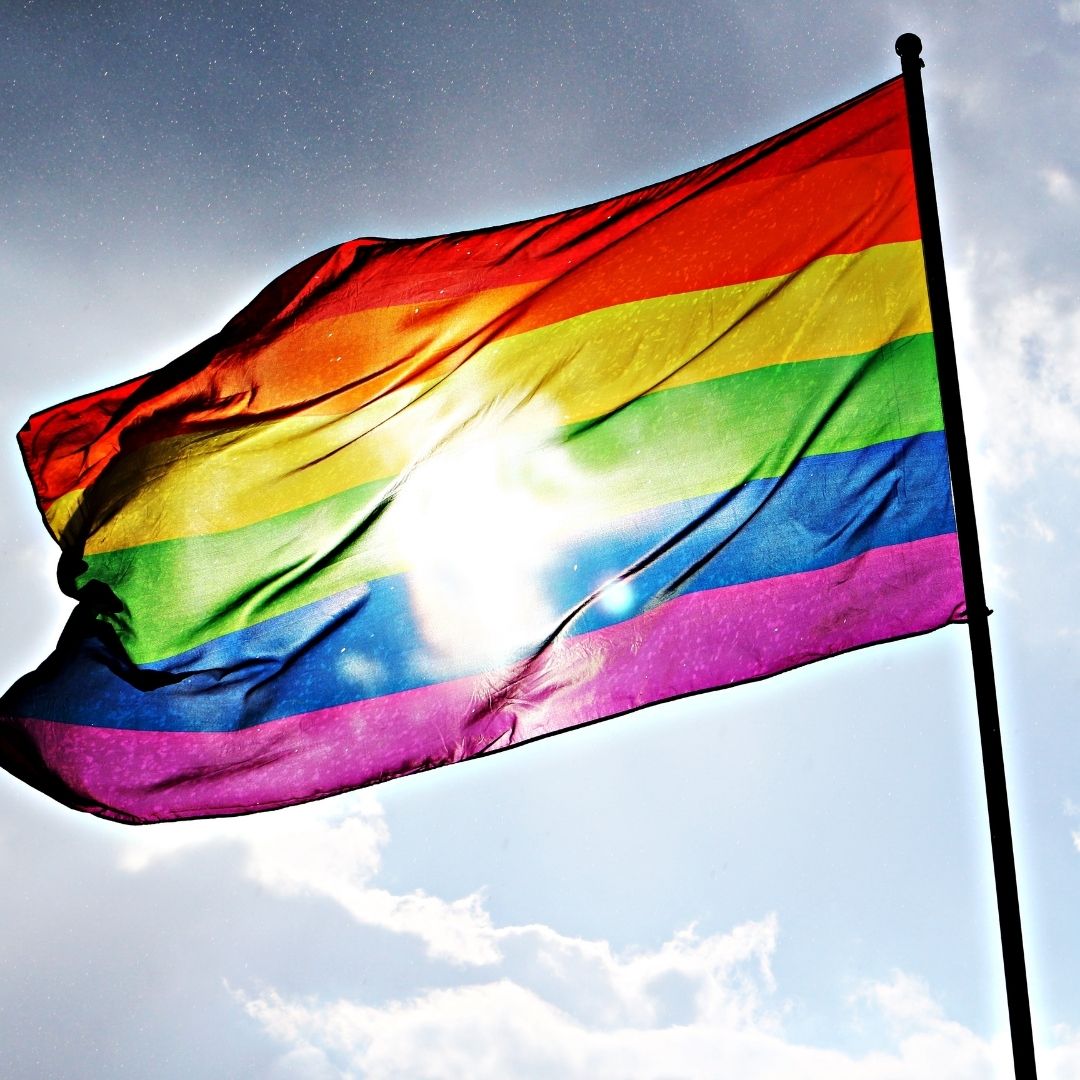
Evelyne Paradis, Executive Director of ILGA-Europe reflects on the annual Gathering, the online version of Europe and Central Asia’s LGBTI conference, and what it affirmed for the movement at this time of momentous change.
It’s already been a month since our second Gathering Online (oh, how I hope it will be our last!) and I’ve had a bit of space to reflect on the incredibly interesting, thought provoking and forward-thinking discussion we had during that week. There was so much to be explored under the theme of this year’s Gathering Online, ‘The Power of Us’ in these times of profound change. Here are messages that emerged from these rich conversations.
Accepting change as a fact of life is empowering
We began The Gathering with a virtual version of our Queer Ed keynote speech, which has been an opening staple of the conference for many years. The format was an online conversation between myself and the wonderful Natia Gvianishvili, who has been actively engaged with local, regional and international LGBTI and feminist movements for over a decade now. As a person who’s actually raised her consciousness around the fact that navigating change is a constant part of life, Natia was the perfect person to begin exploring the complexity of navigating change as people, as communities, as organisations.
The way Natia told us of her own journey — from life and activism in her native Georgia, to where she is now, currently residing and working in Sweden — provided many insights of just how multifaceted and complex change can be. Her story is just one story, but one that illustrates so vividly that change happens all the time, small and big, and on multiple levels, for us as individuals, for our communities, our loved ones, our countries. Natia’s story is also a very empowering one. Yes, transformation is often hard, yet Natia so eloquently talked about the many ways in which she’s learned about her own strengths through it.
We need more of those stories to be told. What I took from our conversation is that, by being more explicit and deliberate about sharing our complex relationship with change, it becomes easier for all of us to find our own compasses when navigating a constantly changing world. The more we learn to be okay with that fact, the easier it becomes for us as individuals and collectively, to no longer be taken by surprise when big changes happen, or at least not to the same extent. Also, if I am more comfortable with change myself, it is going to be easier for me to be there for other people.
There is a renewed commitment to solidarity and collective courage
A message that came through loud and clear across the five days of The Gathering — through panels, workshops and self-organised spaces — was a strong collective commitment to saying that it is essential that all of us stand with one another, and act in support of each other. Solidarity is essential to make sure we withstand efforts to rollback on what we’ve gained and to sew seeds of division between us, but it’s also a crucial condition to creating the world that we want.
It feels as it was the beginning of our collective brave space, one in which we got to naming the things that make us vulnerable in a way that was calm, collected and thoughtful.
I was really heartened to hear again and again that everyone is on the same page in this respect. And perhaps even more heartened to observe that we were finding ways to meaningfully talk about why it’s so often still difficult to act in solidarity with each other in reality, despite our intentions.
Mirka Makuchowska from KPH in Poland spoke very poignantly about us moving into creating “brave spaces,” of being able to talk about hard things with honesty, compassion and care. Thinking back to The Gathering, it feels as it was the beginning of our collective brave space, one in which we got to naming the things that make us vulnerable, as individuals and as communities, as movements and organisations, in a way that was calm, collected and thoughtful.
What emerged from this is that, throughout the Gathering sessions, we went beyond the surface of simply saying we need to work together, and then saying it’s difficult. We were explicit about what we need to be working on if we’re collectively serious about doing this together within the movement and across the movements.
During the mid-week panel on rallying around our common purpose, Mirka also reminded us that, “If you’re in a place where you have to defend yourself, it’s going to be very hard to be open to hearing from others”. This is very true. We must recognise that, in our movement to really be able to be there for others, to reach out to others and support them, you need to be in a good place yourself.
We also talked about how solidarity is about mutually respectful relationships, between individuals, between communities, between organisations, between different sectors. Not only must there be trust that others are not there to harm you, but also that they are there to hear and listen to you, that whatever you bring will be valued.
We must help open doors… and keep them open
One thing that really stood out for me came from Ilaria Todde of E*LC, who said that being an ally is not just opening the door for people, it’s about making sure that you’re there to keep the door open. That extra bit of keeping the door open is an image that we don’t hear enough. Being an ally is not just about making the connections, it’s also about being there when the person can’t be there. It’s about saying, “I’m going to be there to help you get there. But I’m also going to be there to help you hold this space, because I can.”
Cross-movement solidarity is important, to take on structural inequalities
What brings different groups and organisations together as allies? This was another recurring question during the week. We’ve answered by saying shared values, shared perspectives, or in the words of EU Commission anti-racism coordinator, Michaela Moua, a shared belief believe in human rights and equality for everyone. We also named a shared experience of structural inequalities, which is both what most of our movements have in common and what is perhaps the most significant challenge to cross-movement solidarity.
The world is pitching us as working against each other, competing against each other, and it’s not always easy to see that, or to see a way through and out of that.
Indeed, none of our allyship and solidarity happens in a vacuum. It all happens in a society where there are a lot of structures that influence how we relate to each other. We have different advantages over each other, we have different access to resources and privileges, and there are profound structural inequalities that very often we have no control over and yet which deeply influence how we are able to relate to each other. As Freek Spinnenwijn, Director of FEANTSA, which works on homelessness and housing exclusion, asked, where do you begin building coalitions with others when you’re made to feel like the issue you work on is dismissed as less important? In this context, how do you come to the table with an equal voice?
These are things that get in the way of many of us working together more, whether it’s person-to-person, organisation-to-organisation, movement with movement. The world is pitching us as working against each other, competing against each other, and it’s not always easy to see that, or to see a way through and out of that. Cross-movement allyship can’t work without being honest about the challenges, and without being ready to take on these complicated discussions with each other.
It is my great hope that next year, we pick up these conversations — and many more that took place during our Gathering Online — in person once more for the ILGA-Europe annual conference in Sofia. In the meantime, I will leave you with this thought, which has arisen for me from The Gathering:
The world is in a state of extreme flux, and while this is a challenge for all of us, it is also an opportunity. It is helping re-centre us as a movement to the essence of solidarity, and as a result we’re moving away from differences, from the things that threaten to divide us. So, let us restate our shared values and goals, our commitment to working together and to be there for each other, as people, as activists and organisations, and let us form new bonds with other movements with the goal of equality for all firmly in mind. Let us do it mindfully, with real intent to ask questions, name difficulties, and explore common ground with courage and honesty, so that we can continue on our journey towards a more equal, fair and just world for everyone.
An evolving movement: What we learned from Europe’s largest LGBTI Gathering
The virtual replacement for ILGA-Europe’s annual conference, The Gathering Online 2020, was the largest coming together of LGBTI activists from across Europe and Central Asia since Covid-19 began, and a new collective agenda became fully apparent. ILGA-Europe’s Executive Director, Evelyne Paradis, reflects on a ground-breaking experience.
In March of this year, as most of the world came to the realisation that pretty much no large-scale events would be taking place during 2020, we had to take the difficult decision to cancel ILGA-Europe’s Annual Conference for LGBTI activists from across Europe and Central Asia, which was supposed to take place in Sofia this October. However, it quickly became very clear that some kind of replacement event would have to be held. There are so many important questions that we have to ask ourselves as a movement at this moment in time. We have found ourselves in a crucial period of history where so much is changing, and changing rapidly. At ILGA-Europe we knew it as extremely essential to come together, even in an imperfect format, to pull our experiences together, to pull our thinking together, and to pull together the questions that have arisen over the past eight months.
The thinking behind our Gathering
Over a period of time and discussion, we came up with a virtual event, The Gathering Online 2020, which we held over the course of a week, from October 19 to 23. We called it The Gathering Online, as opposed to the Annual Conference Online, because we wanted to be clear that we weren’t going to be able to recreate the entire feeling of the conference. Although there’s an awful lot that you can do online, you can never replace in-person meetings and events. Having said that, we know just how important the annual conference is for so many activists, as a space where they can connect, reconnect, and feel like they’re part of something larger. It’s a place where LGBTI activists can get that sense of solidarity, of belonging, of hearing about how others are doing the work, how they’re coping and how they’re making change happen. We know just what the conference represents every year, so it was important to try to create a space where a version of that could happen.
How do you convey the sense of connection? How do you create a space to have really complex conversations? We wanted to do this in a way that felt true to ILGA-Europe, which is to do it in a way that was as accessible and participatory as possible. It was a very ambitious proposal and from a practical point of view, we had to learn how to do it from scratch. It’s a testament to the ILGA-Europe team how much learning was done in such a short amount of time. At the Gathering Online itself, or ‘GO’ as it became to be known in staff communications, we learned by doing and we delivered something very close to our original vision. The formal evaluation has yet to be appraised, but based on initial feedback and a preliminary glimpse into the evaluation, it looks like we succeeded in what we set out to achieve.
A journey towards hope and action
The idea quickly became about taking participants on a journey throughout the week, one that would move towards a positive outlook for the movement. We started with acknowledging the very complex trends and developments in our world at this moment in time, not all of them negative. The mobilisation that we’ve seen around Black Lives Matter, for instance, is a complex issue and brings its share of challenges internally, but is clearly a long-overdue and positive development. But we also had to start with naming some incredibly heavy issues and acknowledging not only how these have translated into in real terms for people in their daily lives, but how they are specifically affecting activism.
The point of going through this stock-taking exercise was that in knowing where we’re at, we could then ask ourselves: How do we move forward? How do we continue to make positive change? So, the second part of the journey was about looking at the many ways in which people have already been adapting and learning, developing creative ways to adjust to the current situation. It was also about looking at some of the strategic questions that are arising in terms of how we need to come to look at things slightly differently so that we can continue to advance.
Then the final part of the journey was bringing it all to the political actors we need on board and who we also need to ultimately be making decisions that will shape the direction we need.
Dividing lines and alliances
The most salient theme that arose from The Gathering Online was the growing emphasis on socio-economic inequalities, and how what’s happened in the last eight months is the realisation of just how deeply economic inequalities and social injustice impact LGBTI communities. We can see more clearly than ever the stark dividing line between those who’ve been benefiting from everything that’s been getting better for some LGBTI people in Europe, and those who are completely left behind. Those socio-economic inequalities also deeply intersect with other forms of oppression, largely race and gender. This is also connected to inequalities in funding and resources, and how organisations are equipped to do the work. Through The Gathering, we’ve all said, ‘We need to put this at top of our collective agenda’.
The other question that was very present throughout the week is how to continue to make positive change happen in increasingly challenging and harsh political contexts. During the week, we named the further rise of populist forces, the use of COVID-19 to curb people’s freedom, the scapegoating of LGBTI people and backsliding on their rights, the polarised political discourse, and anti-gender movements, to name a few. A huge part of these conversations pointed to the importance of working in alliances to resist authoritarian tendencies and to develop compelling narratives in response to populist discourse that targets marginalised groups. Alongside this challenge, it is also clear that we must ensure that LGBTI issues do not fall off the political agenda completely at a time when the pandemic monopolises so much of the public and political attention, and that LGBTI people continue to have access to politicians and decision-makers, that they can have a say in policy-making which affects their lives.
Our week-long coming-together was not about finding all the answers to the many questions that arose. Day after day, week after week the world is changing and we don’t know where it’s all going to land. There’s so much going on in our world that few of us have the space and time to process what’s happening. What we did want to do was to give people a chance to take a step back and reflect on what they have been going through. In the end, one of the benefits of The Gathering was precisely that; through exchange and hearing from others, many of us actually took time to begin processing where we’re at and what it means as we go onwards.
So, what’s the way forward?
In our work at ILGA-Europe with activists and organisations across Europe and Central Asia, it’s been proven time and time again that people can find the way forward for themselves, if they are given the space and the means to do it. People find solutions for their communities at the most immediate level. What emerged clearly from The Gathering is that we need to sustain LGBTI groups and organisations, because if they fall it’s not just support at a community level that will dwindle and stagnate, but all the political work and gains will fall backwards and so much will need to be rebuilt.
I think we’re at the place where collectively we understand concretely what it means to act in solidarity with one another. It’s no longer just a theoretical thing or a principle that we should be working together. At The Gathering we all acknowledged the need to do much better at making sure that all voices were heard and represented in developing a vision that includes everyone. I also heard a strong desire to be striving together with humility and mutual respect for the greater good. Our common humanity was shining through.
At the end of the final plenary session, I surprised myself over how emotional I became. I didn’t know it was possible to find that feeling we find at the end of the annual conference at an online event, where people were in their own living rooms instead of together in one physical space. It showed me that we are a movement based in real feeling, in respect and love for each other. And that gives me great hope, because that deep feeling and that respect for humanity will give us the resilience we as we move forward into what is undeniably going to be a difficult time.
There are so many questions pending for next year’s conference, never mind 2022. We have no idea what kind of conditions will need to be met to be able to hold large-scale events a year from now, what we’ll need to do to ensure our collective and individual safety, never mind how many of will be able to travel, or will have the means to travel. But while we are being realistic, we fervently hope to be going to Sofia next October and to be meeting with our beautifully diverse and vibrant community of activists there. In the meantime, at ILGA-Europe we will be taking all we learned at The Gathering Online 2020 and translating it into the coming work.
Evelyne Paradis is the Executive Director of ILGA-Europe.
Announcing the Cancellation of ILGA-Europe’s 2020 Annual Conference
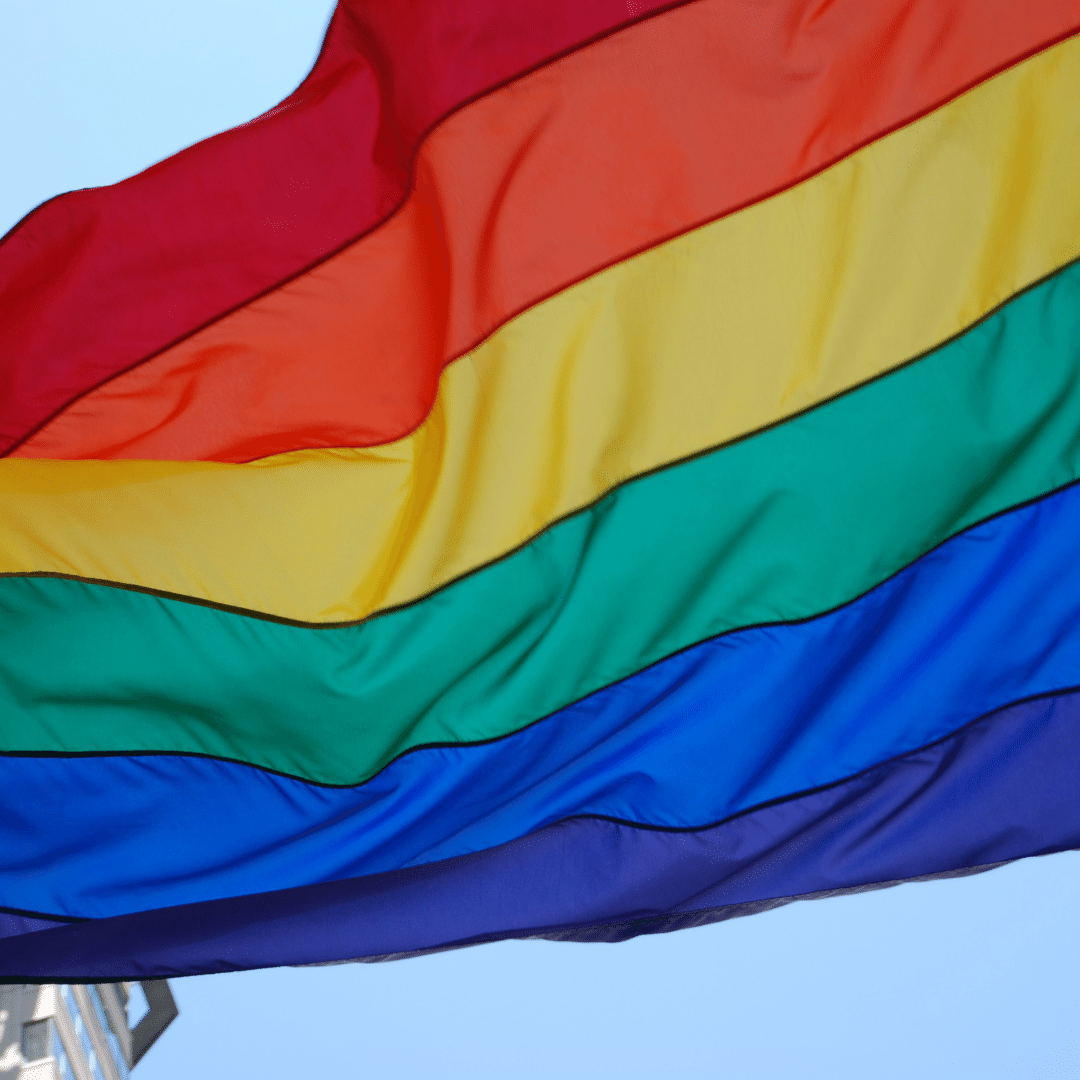
After thoughtful consideration, it is with a heavy heart that we are announcing the cancellation of ILGA-Europe’s 2020 Annual Conference.
The ILGA-Europe board made the difficult decision as countries across the world take unprecedented measures to slow down the Covid-19 pandemic.
While the conference is some months away, there are many risks in continuing to plan this event, with so much uncertainty about how this pandemic will evolve over the coming months. We have considered several scenarios: playing our part in limiting large gatherings when social distancing is still required; having to cancel the event at the last minute due to new waves of restrictions (with important financial consequences for ILGA-Europe and participants); ensuring the health and safety of all participants at the event and their communities back home upon their return; and significant travel restrictions limiting the ability of a huge number of people from attending the conference, among others.
We also considered the impact of the response to the pandemic on our movement. Our communities are amongst the most vulnerable at the moment. Many of your groups and organisations are already seriously impacted by this crisis, financially and politically. We see how the work of all our organisations is quickly shifting and how our priorities will change over the coming months to meet new emerging needs. In this context, too many may not have the time, space and resources to attend the ILGA-Europe conference, thereby limiting attendance to the more privileged amongst us.
After having carried out an extensive assessment of the situation, we have concluded that it would be irresponsible to go ahead with planning this year’s annual conference.
While cancelling the annual conference is heartbreaking for the ILGA-Europe team, it will also enable us to continue to support our movement as best as possible in these times. We will reprioritise our time and resources to adapt and shift huge pieces of work in order to stay relevant to the rapidly-evolving needs of LGBTI activists and groups across Europe and Central Asia in these unprecedented times. In the coming days, weeks and months we want to work alongside all of you in making sure that LGBTI communities get the support they need during these times; to make sure that our changing advocacy needs get heard; to find new opportunities for our movements to work together; and to work with funders in ensuring that our critical work is seen and supported.
Over the coming weeks and months, the ILGA-Europe staff and board will work on alternative ways for our membership to come together. We of course need to think about alternative ways of holding the Annual General Meeting which is essential to our organisation’s good governance. The board will work hard to make sure that we are able to go ahead with creating a virtual space for members where can take part in the democratic life of the organisation, especially as there are a number of elections to take place this year. Who knows? This might be an opportunity to bring more people to participate in board elections and make discussions about our work programmes and finances accessible to a wider number of members!
We all know that the Annual Conference is so much more than the general assembly. It is a place where we connect, network, learn from each other, offer solidarity and support to each other. At a time when social distancing is the best way to care for each other, the ILGA-Europe team will take on the challenge to explore alternative ways to serve the important goals traditionally met by the conference, and further ways for the movement to come together this year to learn from each other and mutually support. We will dedicate a portion of our time in the coming months to learning and enhancing our capabilities to create new platforms for sharing good practices and organising online spaces for the movement to connect.
We are grateful to our local hosts Bilitis Resource Center Foundation, GLAS Bulgaria Foundation, and Youth LGBT Organisation, Deystvie for being so understanding about the cancellation of our conference. To our friends there we say: you have been wonderful working with us so far, we will continue to work with you and bring the 2021 conference to Sofia.
For now, let’s all take care of each other and of our communities. Let’s protect our communities and our work, let’s adapt to continue to advance equality and social justice, and let’s rally to overcome the current challenges. Let the work continue and let’s open ourselves to many innovative initiatives in between.
Until we come together ever more resilient and stronger to celebrate the 25th anniversary of ILGA-Europe in 2021, we are with you as all of our work goes on.
Voices of ILGA-Europe: On the frontlines for equal marriage in the Czech Republic
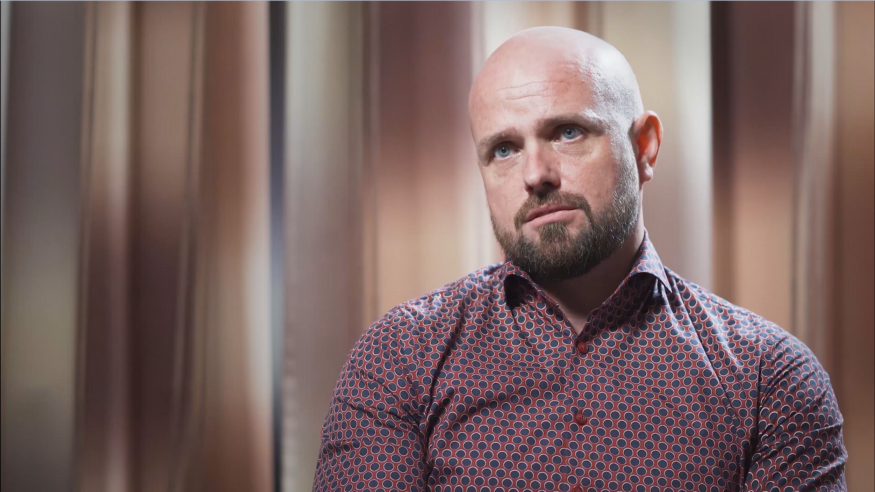
From the high-powered offices of government, to the vanguard of the Czech Republic’s LGBTI movement, Czeslaw Walek tells his story of activism in action.
Our second Voices of ILGA-Europe contributor is Czeslaw Walek, the Chair of Prague Pride, who we met during our most recent conference in Prague. Czeslaw talked to us about the frustrations that powered his journey from the high offices of government to becoming one of the Czech Republic’s most prominent activists, and how ILGA-Europe has helped along the way.
“When we started, we didn’t know what to expect,” says Czeslaw Walek, remembering the very first Pride in the Czech capital of Prague, back in 2011. The march was a huge success, and since then has grown from strength to strength. So too has the Czech Republic’s LGBTI movement, to the point that the country could well become the first post-communist country with full marriage equality.
“At this moment we are a bit stuck in the parliament with the discussion,” Czeslaw says, referring to the delay tactics used by the opposition in parliamentary debates. “But the actual marriage equality campaign is a big success, because it’s not only lobbying and advocacy in the Parliament, but it’s a nationwide conversation about who LGBT people really are and what position in society they should have.”
To find out more about the human rights situation of LGBTI people in the Czech Republic, visit the country’s annual review page here.
Watch Czeslaw’s video to learn more about the fight for marriage equality in the Czech Republic, and how his feelings at the very first Prague Pride showed him that LGBTI Czechs could achieve great things.